#anyway i went after lyrics for these examples but just generally when going through the playlist the first time
Explore tagged Tumblr posts
Text
also in terms of the bolas playlist it's fascinating to me that the songs added by each person have a slight tendency to represent a consistent aspect of bolas
like
the songs added by slime are their chaos
the songs added by philza are their rebellion
the songs added by cellbit are their rage
the songs added by baghera are their anguish
it's so fucking FASCINATING TO ME but i don't know enough music theory to elaborate lmfao this is Vibes Only
(mouse's songs i can't boil down to an easy noun which is why they aren't mentioned lmao anyway they go hard asf)
(also i went on the longest fucking unhinged elaboration in the tags lmfao i almost didn't have enough tags left to tag "long tags" at the end
(i could have even gone on longer in terms of where their characters were at entering purgatory [philza: cage for a cage; cellbit: fed worker murders; baghera: her past as a federation experiment; slime: turning into a code because of the code pretending to be his daughter] but i ran out of space and also time it's 4AM AAAAA)
#qsmp#qsmp purgatory#this is a sweeping generalization btw esp for baghera's she added a WIDE variety of music#qsmp bolas#sorry i forgot that tag existed lmao#i will elaborate slightly:#slime added: find your flame; gas gas gas extended; waltz of the meatball man; foghorn sound effect#philza added: b.y.o.b.; throne; the melting point of wax#cellbit added: hayloft II; brazilian dança phonk (which roier literally played during purg while beating the shit out of bbh lmao)#baghera added: can you feel my heart; still waiting; and coincidentally she added 'it's been so long' (the fnaf song lol)#TO BE CLEAR THESE ARE GENERALIZATIONS#baghera also added the government knows [REBELLION] and oops [CHAOS]#philza added given up [ANGUISH]#cellbit added zombie [ANGUISH] and tokyo drift [CHAOS]#slime added as above so below [ANGUISH]#it's not a perfect category; ESPECIALLY for baghera's songs i want to make that so clear in these tags#HOWEVER. it is interesting.#anyway i went after lyrics for these examples but just generally when going through the playlist the first time#i kind of learned that like.#music to murder to was probably cellbit; punk millenial music was probably philza#the wackiest shit was probably slime (was shocked to find out tokyo drift was a cellbit song for this reason lmao)#baghera's i usually could only pin down bc it didn't sound like anyone else's#and mouse's added songs i could not describe the vibe if you threatened me for it but it has one#i guess the closest vibe is 'a college radio station run by anime fans' and even then it's not that close#it kinda excludes songs like the b//ad bun//ny songs#unless college anime fans are also fans of them in which case great!#IDK IT'S 4 AM I WAS JUST MAKING MYSELF SAD ABOUT TILIN I NEED TO GO TO SLEEP#shut up vic#block game brainrot#long tags
82 notes
·
View notes
Note
This interview was a blessing!! So many things to pick from! But how about this one, where Pete talks about their first shows after hiatus, how magical it was, because he didn’t know if they would ever be on the stage together again, how he didn’t want to take it for granted, how he wanted to cherish every moment, and it’s just beautiful. And in the midst of it he remarks, that he doesn’t always have this memories of their first things, warped tour for a example, was kind of a blur for him with a lot if things happening at the time. And I’m like reading those lines and thinking to myself, yeahhhh, ALL of the fob songs and Pete’s lyrics post THAT summer are DEFINITELY about mi*key fucking w*y… but anyway, it’s the comparison of this two moments of his life, that really did it for me.
anon i absolutely LOVE that connection! i didn't even put those pieces together and now i am just...head in my hands...peter....
last night GT and I were talking about how, despite there being a lot of rhetoric regarding pete "bringing patrick back" from the hiatus, there's actually more evidence that points to it being...kind of the opposite. i'd even argue that patrick was more open to doing fob again than pete. yes, he had a lot of bitterness and anger toward pete, but that was more related to interpersonal issues than anything.
in all reality, though, i don't think either of them was attempting to "bring the other back" to the band; if anything, they were just realizing/accepting the need to get back to each other. fob happening again was because they started to feel that spark again, and they wanted to feel it again as all four of them...knowing the alchemy the entire band brings to the table.
and, in pete's case, yeah - he went through hell and rebuilt himself. he matured. he was a dad. if he was going to go...do this whole thing again, he wanted it to be meaningful. it had to be worth it. he wanted to FEEL it this time. and i think that's really evident in his general presence and approach to things now. that was still important to him with making stardust. he is NOT just looking to throw shit at the wall, here. it's important for him to be "all in," or else...what's the point?
thank you thank you for coming to flail with me, anon. always a fun time <3
(also you obviously know me well with that m*key comment hahaha genuinely made me cackle out loud when i saw that. NONE OF THOSE SONGS ARE ABOUT THAT MAN!!!!)
3 notes
·
View notes
Text
Harry Styles and Two Loves - A love that dare not speak its name.
‼️Disclaimer I am in no way an English literature expert or student for that matter and can barely organize my thoughts but I’ll try my best. If something doesn’t make sense or is regretful thinking please tell me‼️
Basically Harry is a fervent reader that does not limit himself to Buk*wski and Mur*kami though for some reason he loves to bring up those dudes. Queer literature seems to play a big role when it comes to his inspiration and I love that about his music. A good example is his Shakesqueer Sweet Creature madness. But another one that I hold close to my heart are the parallels he draws with Alfred Douglas’ poem, Two Loves.
Here is the full poem. Give it a read if you can because I won't break it down verse by verse for this post sorry :(
To make it short, the poem is about the narrator (let's say Douglas) wandering in a garden where he meets a young man that turns out to be his lover. For context, Alfred Douglas was very much queer and in a romantic relationship with Oscar Wilde. Both developed their own coded language to express their love and ''sexual tendencies'' through their art (been this way foreverrr will we ever leaarn). However they were not always so sneaky about it and Two Loves in particular was so in your face that it was used against Wilde to prove his homosexuality in trial. He did get away with it this time. Here is his defense. Blueprint of denials. No iPhones at the time.
In Two Loves, two different personifications of love introduce themselves to Douglas and his lover:
The first love is loud and cheerful and sings about pretty women and men that love the said pretty women.
The second love is discreet, almost erased by the other’s presence but is beautiful and draws the attention of the narrator.
Obviously the first love is Heterosexuality, the one that is openly praised by society and the second is Homosexuality who is bullied into silence by Heterosexuality if he tries to speak. The poem ends with Homosexuality saying "I am the love that dare not speak its name." Yeah. And isn’t that the story of H’s career.
HS1 opens with MMITH which ends on "We don’t talk about it, it’s something we don’t do". And from there follows SOTT, "We don’t speak enough". And right after we get the very loud, very explicit and very well documented Carolina. So far the album narration goes "There is something painful going on but we can’t talk about it, I say ‘we’ because there is a you and I and yeeEEAAH THIS GIRL I MET ONCE GETS A WHOLE SONG THE WORLD DESERVES TO KNOW HOW GOOD SHE FEELS FOR A LADDY LAD LIKE ME ALSO HER NAME IS TOWNES YOU CAN CHECK FOR YOURSELF SEE IF SHES REAL I LOVE REAL WOMEN AS IN WOMEN THAT EXIST". Heterosexuality is loud and sings about pretty women right.
But then, THEN we get Two Ghosts. Which is the center piece of this whole post. I mean, the title... Two Ghosts//Two Loves Two hearts in one home ? Sick.
The parallel that hits the most is the physical description that is made of Douglas’ lover and of Homosexuality (which are technically two different characters in the poem).
Douglas’ lover / Homosexuality
Same lips red / Same eyes blue / Same white shirt
Red were his lips / His lips were red / His eyes were clear as crystal / His large eyes were strange with wondrous brightness / White as the snow / His cheeks were wan and white
In Douglas’ poem, it is meant to be understood that the young boy he meets first, his lover, is related to Homosexuality through their physical appearance. Douglas’ love is therefore inherently queer. With Two Ghosts, I’ve always wondered why Harry chose specifically to point out a white shirt as it comes across a bit generic and not really personal yk? But if you compare it to Two Loves, it checks out the recurrent descriptive color scheme: red, blue and white. In both works, red are the lips, blue are the eyes, and white is the ~envelopp. RIGHT. I suppose Harry didn’t feel like describing his lover with pale white skin since it’s brown with lemon over ice when under summer skies so he went with a plain white shirt instead.
I’m not going through a whole analysis of Two Ghosts yet I can safely say that it deals with unspoken words. Not saying things is a recurrent theme in H’s songwriting but within the album, Two Ghosts is the first song that deals with it through the undeniable prism of romantic love. Right before with Carolina, H had no issue being straightforward and wanted to "scream and shout it out", but with Two Ghosts he’s tongue tied and doesn’t say what he really means. Communication issues go on with the following track Sweet Creature, btw may I just:
But oh, Sweet Creature (!), Sweet Creature
Would he […] cry "O sweet creature!", Othello
I cried "Sweet youth…, Two Loves
Queer Literaturry is going wild(e).
Expanding this post with Sweet Creature allows me to speak about the garden metaphor. In lyric poetry, the expression of emotions is often done through nature. It is a process that Harry seems pretty fond of when singing about love (ie Olivia, Adore You, WS, Canyon Moon and Sunflower are good examples) but it’s way more subtle with TG and SC. In Two Ghosts, nature is the moon, and in Sweet Creature it’s the garden.
Would you look at that, Two Loves happens to combine both:
Moon dances over your good side and this was all we used to need, Two Ghosts
Running through the garden oh where nothing bothered us, Sweet Creature
Flowers that were stained with moonlight / Alone in this fair garden, till he came unasked by night, Two Loves
For Harry, the night is where the moon enhances his lover’s beauty, when it’s just the two of them and they need nothing more than each other. The garden is where they run (free?away?), once again alone, unbothered. For Douglas, Homosexuality took form and began to occupy the garden at night, while Heterosexuality who thrives in the golden light (um I- nvm) wasn’t paying attention.
It is also interesting to note that Homosexuality is associated with the night but also with death. And he’s super pale. So like… A ghost ? ANYWAY.
The garden in Two Loves is where love happens, it is a piece of heaven. It’s elevated on a hill and untamed with flowers of various colors growing everywhere. There is sunshine and moonlight, there are "pools that dreamed" and by pools I assume the author means vernal pools which are habitats where flowers grow and oh look over there:


Nice ruffles on that white shirt by the way. Very Victorian.

Two Ghosts, 2017 Mularry so true
So yeah. I don’t want to go into full analysis mode but I find it all interesting. Once again, Two Loves holds a great significance regarding the Oscar Wilde’s lore, and Harry is probably very familiar with anything Wilde related (don’t even start) and by that I think about the Carnation business.
I’ll just conclude with that quote from Maurice by E.M Forster whom I love very much:
"I am an unspeakable of the Oscar Wilde sort."
#song analysis#idk if it has been widely discussed already#ive done a bit of research and i haven't found anything but if you've seen similar posts dont hesitate to pass me the links#anyway first try at this kind of rambling i hope it's ok eek#but really I love this parallel or at least the idea i make of it lol#harry styles#two ghosts#queer inspo#my analysis
168 notes
·
View notes
Text
I originally wanted to make two separate posts about this but i’m actually making a single one : the overarching theme of love, redemption, second chances and Togashi’s overall positive and optimistic writing are leading me to believe a few things concerning Killua and Gon’s relationship, namely that we’ll get an explicit romantic confession to canonize their relationship, but also that Gon is actually the one who fell for Killua first.
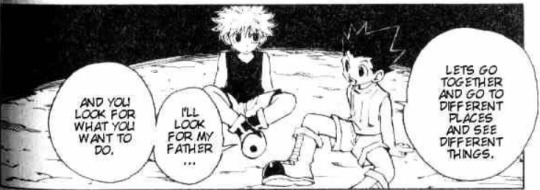
First of all, I know I say it a lot but I really, really do believe that by the end of the manga, Killua and Gon’s relationship will be a canon romantic one. I wrote a short post about this already, but I’m gonna explain briefly my point of view on this as I believe it’s important and relevant to the points I want to try and make in this post.
• Killua is pretty much canonically in love with Gon. There’s just too much subtext concerning this matter, and the “shinjuu” line single-handedly canonizes that fact. Togashi is a very, very smart man, and doesn’t throw random words around, he knows the weight of the word shinjuu and what it implies, and the entire chimera ant arc focuses on Killua’s feelings towards Gon, so there is no doubt in my mind that Killua canonically has romantic feelings for him. These two tweets live in my head rent free because it’s so wonderfully written, so here you go :
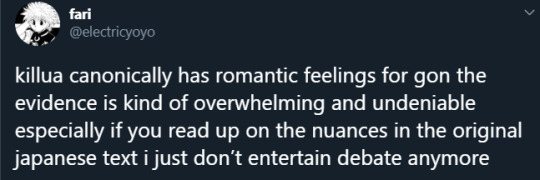

• I also deeply believe that Togashi would never leave this ambiguous. I wrote a full post about this if you want to read it, but basically, it doesn’t fit Togashi’s writing style. A lot of people say that Togashi’s queer rep is ambiguous in HxH, but it’s unfair because HxH is literally not over yet. There are still ambiguous things because the manga is still developing. Thing is, Togashi has put queer characters in his previous works, and it was never ambiguous. It was always explicitely stated. Same goes for the relationships between his characters. There’s no reason to believe this wouldn’t be the case for HxH.
• Togashi’s positive writing is echoed in Killua’s story arc, in the sense that Killua reflects Togashi’s optimistic writing style and the overarching theme of love, redemption, second chances and the power human connection.
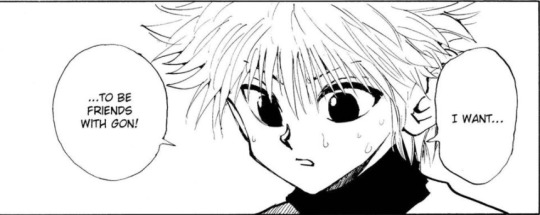
Killua’s character arc is one of slowly changing your life around, becoming your best self with a little help from someone to show you the way, it’s about positive growth, healing from trauma and going against what people think of you. It’s about healing and becoming your best self, no matter what.
It’s a very positive character arc, and one that’s been thoroughly demonstrated during the entire story.
That’s why Killua’s romantic feelings towards Gon could never stay unrequited one way or another, because it just would defeat the entire positive narrative of Killua’s character arc. Because Killua’s character arc is about healing and growing, and even though you thought you could never do that, learn how to love. It’s about finding love after abuse.
And to me, the only way to complete that story arc, when we know that Killua canonically has romantic feelings towards Gon, would be for Gon to return those feelings. Because Killua’s character arc isn’t only about learning how to love someone no matter what, but also about being loved in return. That’s how you complete Killua’s positive story arc.
I’ll come back to this theme a bit later on, though.
• There’s no way Shonen Jump can intervene and censor HxH. Now, I think I’m one of the few meta writers who actually believes this, but I’m 100% convinced that Shonen Jump always knew that HxH is queer work. I wrote multiple posts about this : the first post I linked mentions why SJ probably knows ; on the general gay subtext in both anime adaptations ; on 99 specifically and finally on the fact that it’s weird that gay subtext was emphasized in 99 anime when there was none in canon material only for it to appear later on in the manga.
But to summarize, there’s just no way Shonen Jump doesn’t know.
First of all, Hunter x Hunter is published right after Yu Yu Hakusho. Thing is, Togashi ended YYH for a few reasons, but one of them was because he didn’t feel free of doing what he wanted to do with his story, because Jump kept on declining his ideas.

This led him to completely drop the story. Now, if you’re a manga writer who’s been deeply disgusted by how your last manga was controlled, what would you do ? I’m sure you would make 100% sure you could take your next story wherever you wanted. And I’m certain that’s what Togashi did. Because to be able to write his story the way he wanted, he had to make sure SJ would allow him to go anywhere he wanted. That includes his characters and their relationship dynamics, which are the basics when you pitch a story.
Togashi also emphasized in one of his interviews that he’s free to do whatever he wants.
Furthermore, Togashi’s editors and Shonen Jump aren’t dumb. They can definitely pick up on the gay subtext. If they didn’t want gay things in HxH, they would’ve never let Togashi publish some chapters, ESPECIALLY the chapter where Killua declares he’ll commit shinjuu with Gon. SJ isn’t dumb. Shinjuu hits HARD, especially in japanese, so they definitely know what it means (it’s literally the equivalent to saying them dying together would be like Romeo and Juliet).
Finally, and that’s half crack-theory half serious, but one of the main reasons I believe SJ knows is because of the 99 anime adaptation. It was HxH’s first anime adaptation, and Togashi was involved in it to some extent. Now, 99 is extremely gay. I linked the posts where I talk about it above, but basically, it’s rainbow flags overlay on top of the characters in the opening, gay opening and ending song lyrics, over the top gay lines and situations.... which is interesting. Because like i mentioned in one of these posts, it’s interesting that this gay subtext was present and highlighted in the anime adaptation when there was none in the manga at that stage. It’s very, very interesting that gay subtext appeared later on in the manga, after the anime adaptation went crazy with it. I firmly believe it’s because Togashi pitched his manga as gay to the 99 animators, and if so, that’d mean SJ would also know.

Anyways ! In short, I believe Killua and Gon’s relationship will become canon by the end of the manga because there’s no risk of editorial meddling since SJ probably knows this is where the story is going. Killua’s romantic feelings are also pretty much canon, and the only way to complete his positive character arc would be to have Gon return those feelings and prove that you’re worthy of love no matter what. Finally, Togashi would never leave it ambiguous, because that’s something he’s never done before, and Killua and Gon’s relationship has never been portrayed as ambiguous nor subtle, it’s still developing.
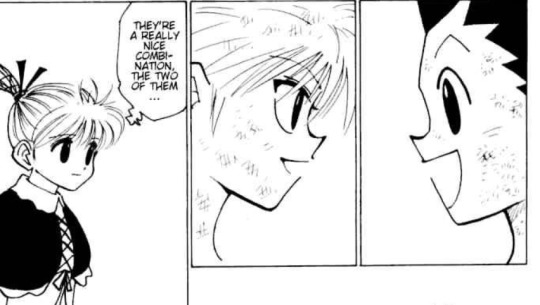
Now !! This was just an introduction to what I wanted to talk about in this post, I’m sorry you still have a bit more reading to do HAHAA
But !
With this belief in mind that Killugon will be canon in the end, there are two things I want to talk about.
• First, I genuinely believe we’ll get a romantic, highly emotional love confession scene between the two of them. For the sole fact that it’s something deeply intertwined with Killua’s character arc.
Like I mentioned above, Killua’s arc is about overcoming trauma and having a second chance at life, a chance to be better, a chance to be your best self. His arc is about opening up his heart to new experiences and new feelings, and learning how to love and pass that love around. His story arc is representation for trauma survivors that things can and will get better, and you can overcome anything, turn your entire life around, heal, and thrive.
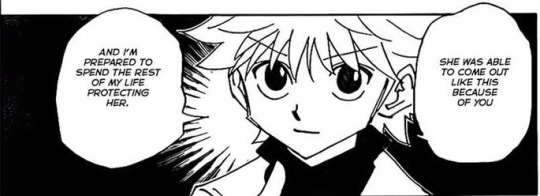
And to me, the completion of that story arc is definitely to show that not only can you learn to open up your heart and love someone, but that you can be loved for who you are. That someone can look at you for who you are, accept you and love you no matter what. You can be loved by someone the same way you love them, in a romantic way.
To me, that’s where the story is going. Considering Killua’s canonical romantic feelings, and the overall positive themes surrounding his character arc, there’s no doubt in my mind that this is the message Togashi wants to convey.
And in my opinion, this message wouldn’t be delivered ambiguously or subtly. This narrative of being loved has always been enforced through highly emotional scenes throughout the manga, to highlight the message that yes !! you, trauma survivor !! can be loved for who you are !!
It’s been expressed through that emotional scene where Nanika tells Killua she loves him, for example.

It’s also been displayed in the countless scenes where Gon expresses his love for Killua, expresses his admiration for him, how he’s glad he’s met him, how happy he makes him, how Killua is his best friend in the entire world.... It’s been conveyed through the stargazing scene on Whale Island, through the entire Zoldyck Family Arc where Gon waltzs in the Zoldyck Mansion to rescue Killua, through the scene in Greed Island Arc where Gon tells him he’s glad to have met him, through the dodgeball match scene where Gon declares that it can only be Killua holding the ball, through the moment Gon says that the first thing he’ll do when he sees Ging is introduce him to his best friend in the whole world, Killua.

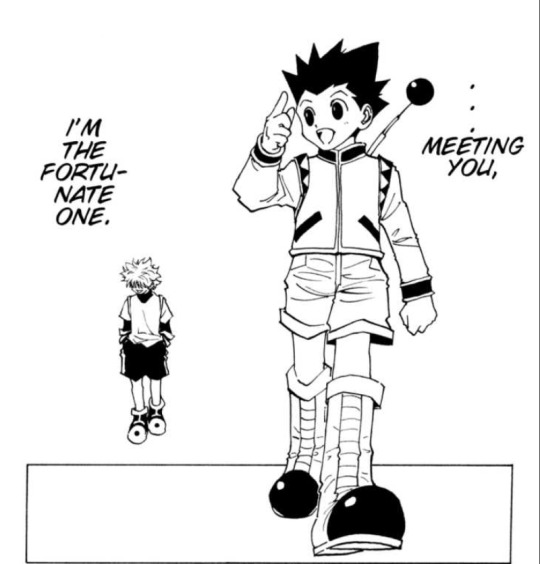
Togashi could have chosen to show and not tell that Gon cares a lot about Killua, and that he finally found someone who loves him for who he is. He could’ve made them hang out normally, and we would’ve understood that Killua found someone who accepts him. But no, this has always been the main theme of HxH. Seeing the both of them grow closer and closer and grow and heal together. He chose to highlight the fact that he’s loved and cared for through words of affirmation to emphasize the narrative of being loved after surviving trauma. For the purpose of providing an extremely clear message of love to trauma and abuse survivors who identify with Killua : that you can find someone like Gon, someone who will love you for who you are. Togashi wanted to make it explicitly clear.
So now, since all of these words of affirmation were “platonic” (i’ll come back to the quotation marks in the last part of this post), but still highly emotional :
Wouldn’t it make sense that the romantic application of this narrative would also be portrayed through a highly emotional scene ?
For the sole purpose of highlighting the final message of Killua’s story arc of overcoming your past and being loved and accepted for who you are, in a romantic way this time ? Of being loved the same way you love ?
Since we’ve had so many platonic reaffirmations of this idea, I think it’d be fitting for the romantic part of the narrative to be conveyed through a highly emotional scene. Like a confession scene under the stars that would parallel the stargazing scene on Whale Island, for example, since stars are thematically fitting since they are linked to Killua’s story echoing Tanabata.
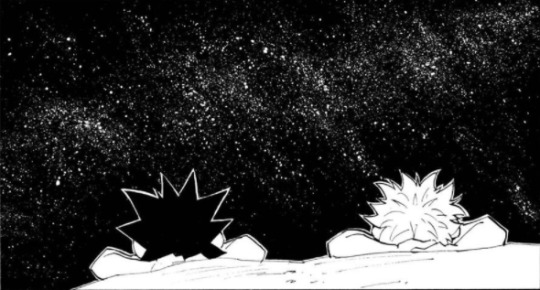
An open love confession would be the final and ultimate way to cement that narrative of loving and being loved. A highly emotional scene, just like we’ve always had, to demonstrate the romantic application of the theme of being loved after experiencing trauma. The ultimate, non-ambiguous message of unconditional love for trauma survivors.
Showing that you, trauma survivor who identifies with Killua, can learn to love yourself, love someone else and be loved in return.
• Keeping Killua’s character arc in mind, I want to adress a final point that I deeply believe is true.
To me, Gon is the one that actually fell in love with Killua first.
Thing is, Gon is that type of character that acts first and thinks later on. He always does things on instinct, only giving it thought after the thing happened. So it 100% makes sense that it would apply to romantic feelings too. That’s why, to me, it’s very likely that Gon fell in love first but just didn’t realize it was romantic feelings, because he’s 12, never really thought about it and feelings are confusing. And to me, Togashi is setting up feelings realization on Gon’s part.
Gon has always behaved very intensely with Killua, always reaffirming how much he means to him. He’s always taken onto that role of providing Killua with love from the moment he met him. He accepted him for who he is, and always made him feel cared for.
Togashi definitely planted the seeds for a possible interpretation of this idea of him falling first. The stargazing scene on Whale Island is just.... so romantic in nature. Gon tells Killua that he’s happy when he’s with him under a starry night sky, tells him he wants to travel the world with him and stay with him, because his presence next to him fills him with joy. Then we have his constant words of affirmation towards Killua, and how cool he is, how amazing and strong he is...
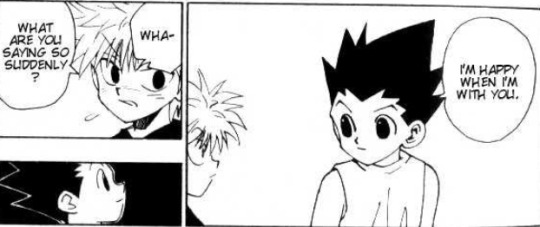
But to me, what really convinces me that Gon fell first is Greed Island arc. Gon’s behavior towards Killua during this arc was extremely emotional. It was deep, deep care and love for his best friend. We get to see him blush as he tells Killua that he’s really, really glad he’s here with him and glad he’s met him.
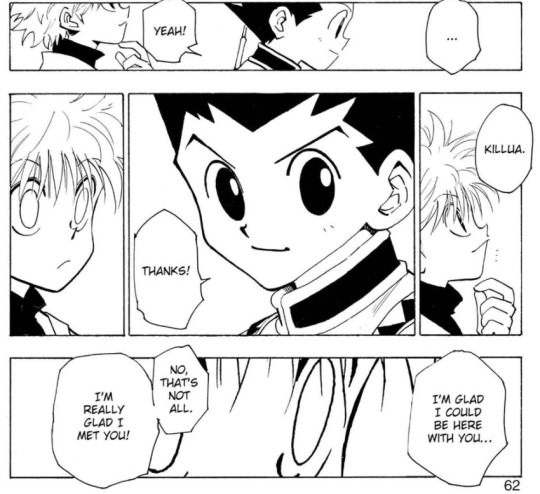
We get to see him declare that the first thing he’ll do when he finds Ging will be to introduce his amazing best friend to him.

But honestly, what made my brain explode is the dodgeball scene.
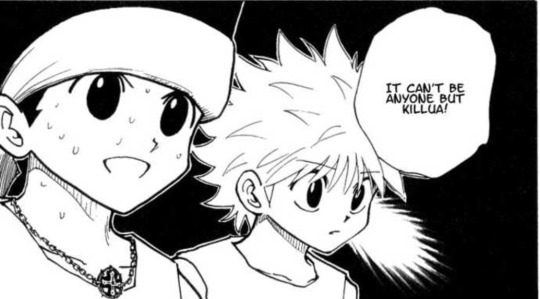
Because as I mentioned in this post, the phrasing Gon uses is one that is used in romantic contexts to confess to someone. It’s a love declaration, literally. And I don’t believe Gon meant it as romantic, because he probably has no idea his feelings are romantic in nature. But. Togashi is a troll. He really, really enjoys toying with his readers.
To me, the fact this sentence is romantic in nature could be Togashi putting Gon’s feelings right in front of our faces, hiding it in double meaning but still plainly there for us to see. It could be Togashi toying with us in the process of setting up Gon’s feelings, so that when it gets canonized that Gon fell first, on a re-read of the manga, you go “oh. that sentence is romantic. it was literally right in front of our eyes the entire time”. I’m probably reaching !!! but!!!! the fact is, this sentence is still romantic in meaning. It’s still coated in romantic subtext. And that’s intentional on Togashi’s part.
I’ll link this magnificent post by Quintessence that basically explains what I just said much better.
In short, it would totally make sense that Gon fell first. It wouldn’t come out of nowhere, since Gon’s behavior from the beginning of the manga can definitely be interpreted as romantic in nature. The countless emotional scenes where he asserts how much he cares for Killua can definitely be read as romantic, and Gon’s behavior can definitely be explained by him having a crush on Killua, despite him not knowing.
Now, the thing that makes me further believe this is true is the fact that symbolically speaking, it makes sense that Gon fell in love with Killua first. It would enforce the narrative of Killua’s character arc of being loved for who you are and not having to earn love.
It would literally dismiss everything Killua believes about having to earn the right to be loved. About having to earn his place right next to Gon. About having to change to be good enough for Gon.
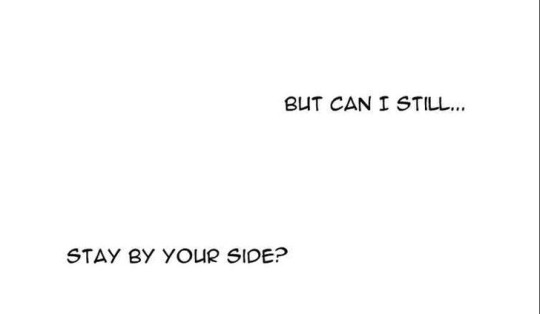
Because if Gon fell first, then Killua was loved for who he is from the beginning, from the moment they met. Killua didn’t have to earn his love, like he thought he had to, especially in CAA, because he was loved the same way all along.
It’d show that Gon didn’t start to love Killua because Killua earned that right by changing for Gon. He didn’t start to love Killua when he started to heal and change his life to become a good person. He was always loved for who he is because Gon always saw him and loved him no matter what.
And that would once again highlight Killua’s character arc beautifully. It’d show that you are worthy of love even if you literally just came out of years of abuse. That someone can look at you and instantly fall in love with you, no matter how broken and unworthy of love you think you are. You never, ever had to earn that love. It was always here to begin with.
It’d break Chimera Ant Arc completely, it’d break Killua’s belief that he was unworthy of staying by Gon’s side and that he had to earn his place. Because he was always loved and never had to earn his right to stay by Gon, because Gon wanted him there all along.
And that is a beautiful, deeply symbolic meaning that would complement Killua’s character arc perfectly.
It’d be Togashi showing trauma survivors that you can heal and love yourself, learn how love someone else and be loved in return.
Showing trauma survivors that you don’t have to prove your worth to be loved. That just like Killua, even if you came out of years of abuse, a broken, scared person, you’re always worthy of love. That you’re worthy of love at any stage of your healing phase. That you’re worthy of love no matter how broken you feel you are.
Someone will always love you and accept you for who you are.
Anyways !! Thank you for reading this !! Those two headcanons are really precious to me and I really do believe they could come true. Because it’d make sense in so many ways !
I know it’s hard to imagine such a thing happening, because queer representation has always been ambiguous that it’s hard to fathom a manga being openly gay, but I really want to be optimistic about it. We got the subtext, the author interested in LGBT-rep, the positive narrative and virtually no risk of being censored.
So I want to stay optimistic on this and believe that we’ll get a romantic love confession as a way to canonize their relationship, and that it’ll become evident one way or another that Gon fell in love with Killua first.
Thanks for reading !!
#hxh meta#killugon#meta#my meta#welp i hope im not reaching too much#but i really really really love the idea of an open romantic confession#and i wanted to explain why it could very much be possible#and i also love the hc that gon fell first#and it makes so much sense on so many levels#and would work with killua's story arc so well#anyways ty for reading this if u decide to do so !!!
860 notes
·
View notes
Note
Not an ask, but a task: I want you (if you want, of course) tu sort your main characters from your book using the @/sortinghatchats system (@/wisteria-lodge has a great short guide to understand the system)
Also, I'd like to know how they were conceived (the characters specifically, not necessarily their story) and what your favorite character dynamic from your book is
thank you so much for the ask anon!! i didn't even know about the sorting hat chats system so you've just opened a whole new world for me lol
i'm gonna use both the characters from my finished book (not all of them, just the ones i would say are the 'main' ones) and the ones from my fantasy book cause there are only two of them and i wanted to see how they'll fit lol. anyways, here's how it would go:
finished book:
-león: (exploded) snake primary, lion secondary. to explain the conception of these characters i need to tell you the origin of the story first. basically, i decided i would keep a diary for a year (2017) and then make a book out of it. it ended up pretty different from real life but nevertheless, león is heavily based on myself as the main character of the book. specifically, he is my 2017-self more or less. of course i've changed a bunch of stuff of his personality (i don't think i would be snake lion for example) but still it's undeniable he's my self-insert at the end of the day. i chose that name cause it's my dad's and great-grandfather's name and i think it's a pretty cool one.
-emma: snake primary, snake secondary. she is loosely based on the crush i had back in 2017. i say loosely cause she ends up being a really vital character in the book and so i changed a lot about her personality and character; the only recognizable traces to her model are like some of her physical attributes and minor details, that's it. i chose that name cause back in the day it was my favorite name. also i was reading madame bovary and there's actually a bunch of references to that book through the names of various characters (see león for example).
-celia: (burnt) badger primary, (bookkeeper) badger secondary. every chapter in my book starts with a song with lyrics i then work into the plot of that chapter. for celia's introduction, she was supposed to be a girl getting bullied in a street i went to that year. i based her appearance and personality partially on this one girl i know and max from stranger things more or less, and ran with it. i definitely didn't realize she would become that important when i first conceptualized the bullied girl. for the longest time her name was just 'the maudes street girl'. i went for celia in the end just because it is one of my favorite names and it fits her personality.
-jimmy: lion primary, lion secondary. i know he doesn't exist but he's my friend okay? anyways i generated the songs for the chapters randomly and for jimmy's first appearance i got st. jimmy from green day and i immediately went OH. he literally popped up into my head the minute i read st. jimmy on the screen, he's literally him. i was reading / watching nana (the anime / manga) at that moment so i just visualized a guy that would fit right into the punk aesthetic there. of course his name was chosen after the song, and his real name, jesús, is also referencing a green day song (jesus of suburbia).
-carolina: (burnt) lion primary, bird secondary. carolina is a weird one, cause i conceptualized her after carolina by m-clan was chosen as the song for her first appearance, and i never really stopped to think about how she is or looks or acts? i loosely based her after cris from skam españa kinda?? at least in her fashion sense more or less. the thing is, i already have a character that dresses similarly and is heavily implied to be a choni, but carolina never really seems a choni herself. she also acts very differently after her first appearance because, once again, i wasn't planning on her being as important as she turned out to be. she's definitely the more underdeveloped character of the bunch and i'm planning on developing her for the next draft.
the book centers around the dynamic between león and emma, but honestly my favorite one is the león-celia one, i think it's very cute and wholesome. i also really like león-jimmy and jimmy-carolina, they're nice i think :)
fantasy book:
-jiji: snake primary, lion secondary. back in the day (i'm talking 2012-2013) when i was first creating my fantasy world, i made a list of all the stories in all the countries of that said world that i would get to write in the future. in there is where i first conceptualized jiji; as a young girl with strong morals that escapes the life dictated for her and her best friend to look for a better life in the fringes of society or somewhere else in the world. over the years i've been polishing her character more, but she's never stopped being that girl; that's in essence who she is. i wanted her to be like katniss everdeen; a cool strong girlie who fights for her ideals and is just a badass. as for her name, i just tried a bunch until jiji sticked.
-li: bird primary, bird secondary. li!!! li was conceptualized much later than jiji, for years he was just 'the friend' until i had to actually create him. as jiji was based around katniss, i wanted him to be more like peeta: soft, charismatic but not action-oriented. i don't think he ended up like that, as he's way more depressing and less charismatic, and he reminds me more of lloyd from harvest moon grand bazaar now ( i know, weird reference). in the end i basically wanted him to oppose jiji in their world-view: whereas jiji is angry at everything and knows pretty well her immediate surroundings but not the rest of the world, li is just contempt with it and knows a lot about a lot of places due to being a bookworm (this might be a bit self-inserty but whatever). as for his name, it's the same story as jiji's, i just tried various until one sticked lol. his name actually has some in-universe lore i'm pretty happy about so that's also nice :)
this book is all about the dynamic between them two so yeah, a pretty easy answer for this one lol.
#ask#sorry about the long post lol#and thank you again!!#these characters are like my children i love them all very much#also i didn't put all of the characters in my book cause they're like...10-15#too many#also about carolina... i'm thinking of making her either la del eyeliner or a basic twitter girl#something like that#the other characters (except for león) have very strong personalities so i think it would be nice to contrast it with mellower vibes#for carol#and li: he basically has poor little meow meow energy
3 notes
·
View notes
Text
Rick Pender knows his Sondheim from A to Z
If the word “encyclopedia” conjures for you a 26-volume compendium of information ranging from history to science and beyond, you may find the notion of a Stephen Sondheim Encyclopedia perplexing. But if you have ever looked at a bookshelf full of book after book about (and occasionally by) the premiere musical theatre composer-lyricist of our era and wished all that information could be synthesized and indexed in one place, maybe the idea of a Sondheim encyclopedia will start to make a little more sense to you. It did to Rowman & Littlefield Publishers, an independent publisher that’s made encyclopedias such as this one of their calling cards, offering tomes on everyone from Marie Curie to Akira Kurasowa. Several years ago, they approached Rick Pender, longtime managing editor of the gone but never forgotten Sondheim Review and now, after years of research, writing, and pandemic-related delays, the The Stephen Sondheim Encyclopedia is finally hitting shelves. I sat down with Rick (via Zoom) to chat about this unique, massive project.
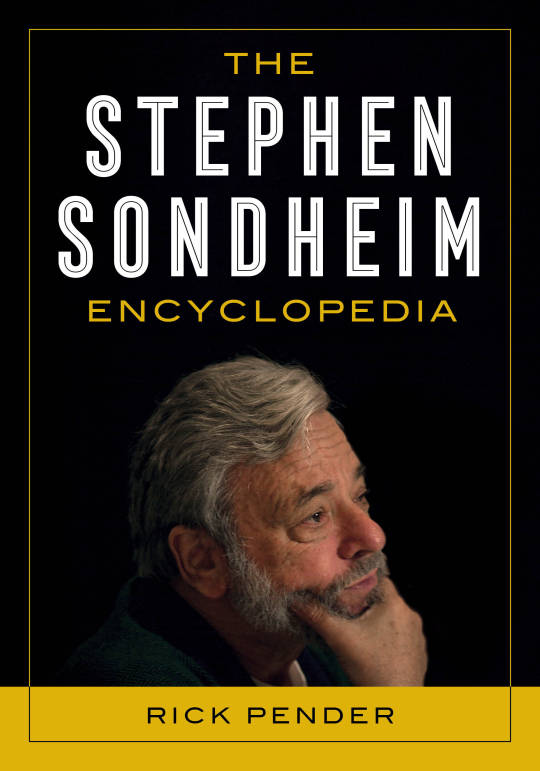
FYSS: I want to really focus on the new book, but we should start with your history with Sondheim and The Sondheim Review. How did you become so enmeshed in this work?
RP: As a teenager, the first LP that I bought was the soundtrack from West Side Story, and I didn't have any clue about who much of anybody was, particularly not Stephen Sondheim. But I loved the lyrics for the songs, especially “Something’s Coming” and “Gee, Officer Krupke.” These are just fabulous lyrics.
Then, of course, in the ‘70s it was hard as time went by not to have some awareness of Sondheim. I saw a wonderful production of Night Music in northeast Ohio, and I again just thought these lyrics are incredible, and I love the music from that particular show. Fast forward a little further in the late ‘80s, I was laid up with some surgery and I knew I was going to be bedridden for a week or two anyway, so I went to the public library and grabbed up a handful of CDs, and in that batch was A Collector's Sondheim, the three-disc set of stuff up through about 1985, and I must have listened to that a hundred times, I swear, because it had material on it that I didn't know anything about like Evening Primrose or Stavisky. So that really opened my eyes.
Later, my son had moved to Chicago. He's a scenic carpenter and a union stagehand. He worked at the Goodman Theatre, and I went to see a production when they were still performing in a theater space at the Art Institute of Chicago, and they had a gift shop there. And lo and behold in the rack I saw a copy of a magazine called The Sondheim Review! I thought, oh my gosh, I've got to subscribe to this! This would have been about 1996, probably, so I subscribed and enjoyed it immediately. A quarterly magazine about just about Stephen Sondheim struck me as kind of amazing.
In 1997-98 the Cincinnati Playhouse did a production of Sweeney Todd in which Pamela Myers, all grown up, played Mrs. Lovett, and so I wrote to the editor of the magazine and said, “Would you like me to review this?” That started me down a path for a couple of years of making fairly regular contributions to the magazine. Then in 2004 that editor retired, and I was asked to become the managing editor, which I did from 2004 to 2016. It went off the rails for some business reasons, but it lasted for 22 years which I think is pretty remarkable.
I tried to sustain it in an alternative form with a website called Everything Sondheim. We put stuff up online for about 18 months, and we published three print issues that look very much like The Sondheim Review, but we were not able to sustain it beyond that.
FYSS: How did the Encyclopedia project originate?
RP: The publisher asked me to write an encyclopedia about Stephen Sondheim! I envisioned that I would be sort of the general editor who coordinated a bunch of writers to put this together, but they said no, we're thinking of you as being the sole author. They had done a couple of other encyclopedias particularly of film directors, and those were all done by one person, so they sent me a contract asking me to generate 300,000 words for this book, and after I regained consciousness, I said all right, I'll give it a try.
It took me about two years – most of 2018 and ‘19 – to generate that content. I sent it off in the fall of ‘19, and then, well, the world stopped because of the pandemic. It was supposed to come out April a year ago, and they had just furloughed a bunch of their editors and everything stalled. But now it's coming out mid-April 2021.
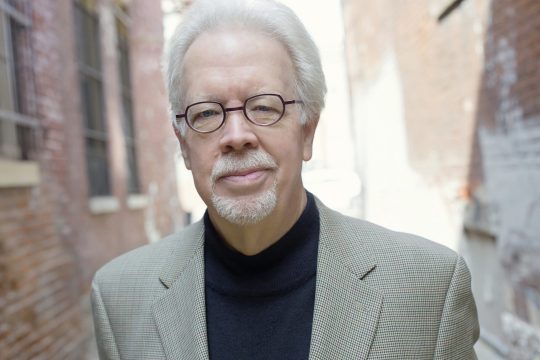
FYSS: What was the research and writing process like?
RP: This project came about in part because the publisher initially approached another writer, Mark Horowitz, who's at the Library of Congress and who had done a Sondheim book of Sondheim on Music. Mark and I had become quite close because he wrote a number of wonderful features about different Sondheim songs for The Sondheim Review. When I heard that that he had put my name out there, I went back to him after I had agreed to do this and said, Mark, could we use some of that material that you wrote for the magazine about those songs? And he said, sure do with them whatever you wish. And I was glad he said that, because they were really long pieces, and I've reduced each of them to about 1500-2000 words, which I thought was probably about the maximum length that people would really want to read in a reference volume.
But other than that, I generated everything else myself. I relied upon plenty of material within the 22 years of back issues of The Sondheim Review. Another great resource was Sondheim's own lyric studies, the two-volume set which provides so much information about the production of shows and that sort of thing.
Of the 131 entries I wrote for this, 18 of them are lengthy pieces about each of the original productions, so again Sondheim's books were certainly useful for that, and other books like Ted Chapin's book about Follies.
I also spent some time in Washington, D.C. at the Library of Congress, and Mark loaned me a quite a bit of material that he had collected – not archival material but scrapbooks of clippings that he put into ring binders of stuff about Sondheim's shows.
I came back to Cincinnati with about four or five cartons of materials, and I could really dig through that stuff as I was working on these. And then I have, as I'm sure you and lots of other Sondheim fans have, a bookcase with a shelf or two of Sondheim books, and those were all things that I relied upon, too.
I actually generated a list with lots and lots of topics, probably over 200, and I knew that was going to be more than I could do. Eventually, some things were consolidated, like an actor who perhaps performed in just one Sondheim show wasn't going to get a biographical entry, but I would talk about them in the particular show that they were involved in. So, I was able to collapse some of those kinds of things. But as I said, I did end up with 131 entries in the publication, and it turned out to be 636 pages, so that's a big fat reference book.
FYSS: Who is the intended audience for a work like this? RP: The book is really intended to be a reference volume more than a coffee-table book. It does have photography in it, but it's black and white and more meant to be illustrative than to wallow in the glories of Sondheim. There is an extensive bibliography in it, and all the material is really thoroughly sourced so people can find ways to dig into more.
FYSS: Sometimes memories diverge or change over time. Did you come across any contradictions in your research, and how did you resolve them?
RP: I can't say that I can recall anything like that. I relied very heavily on Sondheim's recollections in Finishing the Hat and Look, I Made a Hat because he's got a memory like a steel trap. Once in a while I would email him with a question and get very quick response on things. I really used him as my touchstone for making sure of that kind of thing.
I also found that Secrest’s biography was very thoroughly researched, and I could rely on that. But I can't say that I found a lot of discrepancy, and some of those kinds of things were a little too much inside baseball for me to be including in the encyclopedia.
FYSS: For figures with long and broad histories, how did you decide what to include? George Abbott, for example, is the first entry in the book and he worked for nine decades! How important was writing about an individual as they relate to Sondheim vs. who they were more generally?
RP: To use George Abbott as an example, I would say that the first things that I did was to go back to the lyric studies and to the Secrest biography and just look up references to Abbott. I mean, it was George Abbott who said that he wanted more hummable songs from Sondheim, so you know that was certainly an anecdote that was worth including because, of course you know, it becomes a little bit of the lyric in Merrily We Roll Along.
So you know, I would look for those kinds of things, but I also wanted to put Sondheim in context because Abbott was well into his career when he finally directed Forum which, since it was Sondheim's first show as a composer and a lyricist, is significant. That was very much the focus of that entry, but I wanted to lay a foundation in talking about Abbott, about all the things that he had done before that. I mean, he was sort of the Hal Prince of his era in in terms of his engagement in so many different kinds of things – writing plays, directing musicals, doctoring shows, all of that.
FYSS: Did any entries stick out to you as being the hardest to write?
I think the most complicated one to write about probably was Bounce/Road Show because it's got a complicated history, and Sondheim has so much to say about it. And because it's not a show that people know so much about, I wanted to treat it appropriately, but not as expansively as all of that background material might have suggested. So I kind of had to weave my way through that one. It also was a little tough to write about, because how do you write a synopsis of a show that has had several incarnations quite different from one another, and musical material that has changed from one to the other? With shows like that, I particularly tried to resort to the licensed versions of the shows.
FYSS: I haven't had a chance to read the book cover-to-cover yet, but I did read the Follies and the Into the Woods entries to try to get a sense of how you covered individual shows, and both of those are shows that had significant revisions at different times. And I thought you made it very clear what they were and also where to go for a reader who wants to learn more.
RP: Let me say one other thing this is not directly on this topic, but it sort of relates, and that is that in writing an encyclopedia, I didn't want to overlay a lot of my very individual opinions about things, but with each of the show entries I tried to review the critical comments that were made about the show in its original form, perhaps with significant revivals and that sort of thing, and then to source those remarks from critics at those various points in time. And of course, my own objectivity (or lack thereof) had something to do with what I was selecting, but I thought that was a good way to represent the range of opinion without having to make it all my own opinion.
FYSS: Did you feel any responsibility with regards to canonization when you made choices about what to include or exclude? What made the First National Tour of Into the Woods more significant than the Fiasco production, for example? Why do Side by Side by Sondheim & Sondheim on Sondheim get individual entries, but Putting It Together is relegated to the omnibus entry on revues?
RP: I guess that now you are lifting the curtain on some of my own subjectivity with that question. I tried to identify things that were particularly significant. I mean with the revues for instance, several of those shows – you know, particularly Side by Side by Sondheim, the very early ones – they were the ones I think that elevated him in people’s awareness. So, I think that to me was part of what drove that. And then shows that that were early touring productions struck me as being things that maybe needed a little bit more coverage. I think the Fiasco production was a really interesting one, but with the more recent productions of shows I just felt like there's no end to it if I begin to include a lot of that sort of thing.
FYSS: I mean it's so subjective. I'm not the kind of person who clutches my pearls and screams oh my goodness, how could you not talk about this or that. But I was surprised to see in your Follies entry that the Paper Mill Playhouse album was not listed among the recordings, for example. I imagine that once this book hits shelves you're going to be bombarded with people asking about their pet favorites.
RP: Oh, I'm sure, and maybe that will be a reason to do a second edition, which I’m totally ready to do.
The Sondheim Encyclopedia hits bookstore shelves April 15. It’s available wherever you buy books, but Rick has provided a special discount code for readers of Fuck Yeah Stephen Sondheim to receive 30% off when you order directly from the publisher. To order, visit www.rowman.com, call 800-462-6420, and use code RLFANDF30.
Celebrate the launch of The Sondheim Encyclopedia with a free, live online event featuring Rick Pender in conversation with Broadway Nation’s David Armstrong Friday, April 16 from 7:00 to 9:00 p.m. Eastern. More information and register here.
17 notes
·
View notes
Note
1 : I disagree with the anon who thinks tae has a hard time dealing with his sexuality and jk does not. In the earlier years, tae said very conservative things but since a long time now, he has been the loudest supporter of lgbt of the entire group, answers harshly to delulu fangirls and even implied he wanted to sing his love christmas song only with a man because he chose to not release it when a big hit producer made him sang with adora instead of jimin.
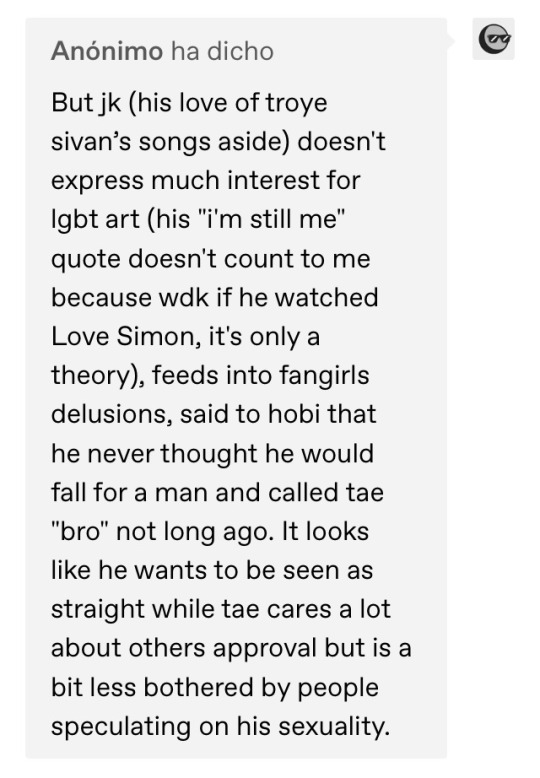
Disclaimer - please keep in mind the below is our opinion / theory on the topic at hand. The timeline is separate from asks and we strive to remain credible, and driven by facts, there. In asks we more freely theorize. Thank you!
Sara: These are my rough thoughts as of 9th of November 2020. General Disclaimer - I could easily change my mind about anything that I say that isn’t included in the actual Timeline due to the extreme level of insight or subjectiveness that asks usually require which can only be answered with opinions in development and insufficient pondering / research. Well, this turned into a discussion which is good :) I do agree that Jk also struggles with his identity and is afraid to be outed without being prepared, which is natural. This would fall in line with him saying he didn’t want “a kiss from a boy” as he panicked in his coming of age day back in 2016 when he already knew he liked Tae (the famous day joon called for tae to kiss him). Mind you, on that same trip Tae said it was weird to hold a man's hand in public when he saw JK and hobi holding hands in the streets of Europe. I don’t think Tae said that due to jealousy. I think it was his internalized homophobia speaking (meaning self-rejecting feelings that are so common within lgbtq individuals where they are affected by what society considers correct. That’s where self-hate comes from). Both Jk and Tae deal with internalized homophobia and they’ll probably deal with it their entire lives to some extent, because it doesn’t necessarily disappear in its entirety even if you come out and “accept” yourself, especially if you live in a conservative environment. I can tell they’ve both come a long way though and they are much more comfortable in their own skin. It’s beautiful how Tae has embraced gay culture and clearly feels part of the lgbtq community. I think Tae seeks for belonging while Jk is much more “independent” and I personally think the idea of “a community” doesn’t resonate with him as much. I don’t know if it’s due to him being a huge introvert or what but not every non-straight person needs to be immersed in the gay scene. There was a time that Jk repeatedly mentioned Troye Sivan as his top 3 favorite singer (while he was self-discovering), recommended “memo” by years & years, etc, and we don’t know what he enjoys in his private life so...at least we know he did find solace in gay public figures during an important period of his life. I love Tae being sassy and shutting down fan’s fantasies, but Jk playing along is innocent and his way of being “friendly”. Jk is the opposite of what toxic masculinity looks like so I don’t see him going out of his way to look straight. He does whatever he wants. He uses women’s perfume, unironically fixed his long hair up into 2 cute ponytails while eating out, enjoys cosmetics and does his own makeup, owns pink items, etc. I’m just saying he doesn’t have a fragile masculinity. Saying bro is just for laughs and to sound cool and american. Him saying he didn’t think he could fall for a guy was a joke to overly compliment hobi while not outing himself. It’s not that serious. He didn’t have the need to joke about crushing on hobi, but he did so VOLUNTARILY. To me it seems like he is pretty comfortable with himself as of now, but remember they are closeted and in a delicate situation.
Kayla - hi anon! The beauty of discussions is each is entitled to their opinion. Respectful discussions are fun - thanks for being kind in your ask☺️I personally think Jk referencing “I’m still me” then taking the time to draw it in artwork speaks volumes. It was around the time Joon recommended a song from the movie and it’s a famous quote so to me, that’s not a coincidence, though you’re entitled to discard it if you wish. I also think we need to consider the context of Jk calling Tae bro - an interview in which he looked at his lips at one point, and caressed his back as he said that word. Those two were pretty affectionate through the overall interview. For some, the bro comment is proof TK aren’t together. For me, context is critical. That moment never dissuaded me on them being “real”. I know some will disagree on that so please know that’s simply my interpretation of that moment. Plus my UK friend said soon after that moment she calls her partner “bro” jokingly so I second Sara it may be as simple as that in why Jk said it. As far as the Hobi comment, I feel like that statement alone shows Jk is part of the lgbtq community. He flat out is saying he fell for a man … and I anticipate one would argue he’s joking but, for me, there’s truth in jest. He didn’t have to say that comment yet he did. I just want to leave it as I don’t agree Jk wants to come off straight at all. I mean don’t forget this is the same guy who also said grapes were more interesting than the girls at the shoot...and this was in his teenage years so🤷🏻♀️some may say he was just nervous around the women and that is, of course, totally okay if they interpret it that way. I just view that comment differently. And he’s wearing genderless clothes this year (2020) and changed the lyrics of “savage love” to be genderless, so he shows support, it’s just not in a bold way like Tae. He’s worn a paper clip earring and suppprted lgbtq artists so he does acknowledge the community. I think it just comes down to some people place greater weight on others knowing their identity.
I think Tae wants people to know, hence why he’s expressed loud support in various ways, whereas Jk doesn’t really feel like he needs to address it. My take is Jk genuinely just doesn’t care how people perceive him, and that’s why he isn’t as vocal as Tae, who seems to indicate he really wants people to know his identity. Jk is fortunate to have a progressive family (an example being during his vlive he said, “Anyway, my parents were like that. When I was young, no matter what I did, they let me be and do whatever I wanted to do”), he has loving and supporting members - that support system must have helped greatly as he went through his exploration and struggles. He absolutely struggled, and I agree on that, but I think it was easier for him in some ways because of his environment / support system, and who he is personality wise. Jk is a man of action, not as bothered by the opinion of others (again, we can look to his tattoos as a big indicator of this) whereas Tae seeks validation, even this year, from ARMY. Him saying during pride month, after reading the CMBYN monologue “I want to be happy too🥺” to me shows he still struggled with public perception. Personally, based on private talks I don’t want to get into too deeply in this public setting, I think Tae came more to peace with himself this year. But I do personally think Tae had a harder time coming to terms than Jk did (and has alluded as much when he’s mentioned his struggles with school and puberty, plus some of his solo work). Let me be clear, both struggled, and as Sara says both dealt with internalized homophobia, and I don’t think anyone would disagree with that, but Tae’s overall loudness, for me, shows he wants people to know. That’s why he’s loud. Jk not being loud doesn’t mean, to me, he wants to come off straight. Jk has done an amazing job over the years of smashing others’ preconceived masculinity beliefs and he does it comfortably. For me, it shows he’s just not bothered as much by public perception. He is who he is and it doesn’t matter what people see or think. I’ll agree that Tae definitely is the most vocal member, and seeing him happier and appearing at peace makes me happy, and I definitely don’t think he has any issue with people speculating. I really think it’s important to him for us to know, and i think he wants us to know. As an aside, I know I’m just a fan but I'm super happy for Tae seeming to be more accepting of himself. I know a lot of people, including myself, are touched by him, as well as the other members, for the various ways they’ve shown support to the LGBTQ community.
PS - thanks again for being respectful in initiating further discussions on this topic Anon💜sometimes checking the inbox makes me anxious so I immensely appreciate when people can hold a respectful and kind debate on various topics.
31 notes
·
View notes
Text
Bulgaria brings a mentally reassuring anthem to Rotterdam 2021
youtube
I’ve said so that VICTORIA herself sort of agreed to have done “Tears Getting Sober” if she was allowed to, but for one I have to thank that EBU said that the artists can’t have their 2020 songs back? You’ll see why when I get to the review after two boring paragraphs of text with technical info, for the country that is Bulgaria!
ARTIST & ENTRY INFO
Victoria Georgieva (or VICTORIA, but I can’t be arsed to continuously capitalize her name so I’ll just say Victoria from now on) was born a singer, for she started to sing at the age 11, went to a specific school of angel voices (no really that’s what it was called), and tried to go to the X Factor while a liiiiiittle too young until realizing that she needed to wait for a few years, and wait a few years she did, and went on to the X Factor again.
youtube
She didn’t win, but she still got to sign a contract and sing some stuff in Bulgarian before she decided to rebrand, started singing in English, and completely decided that ballads is her style. She cannot really do upbeat most of the time. So you can’t really have a bop from her in the future. (Well except that there’s a couple of songs in her discography that I personally classify as “bops” but they’re more like... idek sad bops?? but they can be danced to, but I get her, she doesn’t do anything that’s more loud and upbeat and clubby and summery kind of - in short, nothing you can go “YAAASSSS QUEEEEEN” over to.)
The entry she ended up singing, “Growing Up Is Getting Old”, is what I can describe to be about overcoming the emotional twists and turns inside of you as you grow older, because as it turns out, it ain’t what you thought it would be - but if you push just a little further, you realize that if you’re growing up, maybe the life isn’t so bad, afterall - you are able to get up. Somehow. It was written as part of Boris-Milanov-led songwriting camp held during summer, and a lot of people seemed to be a part of it because multiple different folk have songwriting credits on the potential Bulgarian entries this year.
REVIEW
Let’s get this out of the way immediately. I prefer “Growing Up Is Getting Old” to “Tears Getting Sober”. The former sounds a lot less irritatingly underwhelming and a lot more positively overwhelming you with warm emotions and sunglow. “Tears Getting Sober” was a song I could never really connect with - maaaaybe the last chorus is much better on there, but it doesn’t do much for me either, I guess.
Their 2021 forray however is a much different kind of thing - once again, going for lyrical non-cliches, Victoria tells a tale about her inner turmoils and continuing in life, in a way that’s personal to her and also kind of relatable to all of us. We all have these moments of fear and anxiety and nervous systems aching. If only there was someone who’d tell us that we’re worth saving... thanks a lot Victoria, you’re the MVP. Filling in the void that Netherlands from last year had brought us but not anymore - another personal song about getting old and having those kind of feelings inside - and doing a great job at taking the baton in the right way (even with featuring the word “grow” in both of the titles, neat coincidence).
Not only the lyrics feel like a hug, the song just emulates ray of sunshine and golden glitter coming down from the sky, Molly Sanden style. The violins in the G major key playing so precisely, building up momentum throughout the entire song, slowly but surely - starting with the ticking clock in the first verse that may have subtle violin in there; and the first chorus is just so simple piano, and then the second chorus has a tinge of electronic something, and the last chorus goes full in with the backing vocals boosting the song, after Victoria performs the quite magnificent bridge... now I don’t have synesthesia but I associate music keys with colors, and to me G major would always come across as something yellow or orange - “Growing Up Is Getting Old” is a perfect example of why’s that for me. And obviously, Victoria’s love for harmony-humming (even if there’s just one instance of it after she sings “star crossed soul”) complements the song to a T.
And it turned out to be a much better choice than last year’s. Maybe finally a female ballad I am getting behind.
Now I wanna know why the bookies don’t appreciate THIS entry as much as last year?
Granted, now it’s 2021 and the environment is so much different, and the songs have changed, and the dynamics have changed, and now there’s suddenly more competition at stake. And for Bulgaria it fares quite much more underwhelmingly - well, at this moment they’re like 6th, which isn’t bad, but there’s a lack of sung praises coming its way, not quite a feat that “Tears Getting Sober” actually achieved, being the bookies fave right before the cancellation of last year. In general the year has been pretty dry for the previous winner picks like Iceland, Lithuania and this, but I can’t say that the previous winner bets from 2020 are all that dead either? Though I gotta say that Bulgaria wasn’t gonna win 2020 anyway, so it’s a lose-lose in this case.
Also I just can’t at that music video being a little dramatic at the beginning, with the cancellation of Eurovision being presented as if it were a worldwide disaster during which we all shall lock ourselves into bunkers and wait until the better days, eventhough the panini is not war and war supplies kit is not just enough to survive it. But it seems like that the world is quite literally falling apart, as evidenced by Victoria going through all kinds of pathways away from her living room, meeting a (presumably) mini version of her somewhere in between, and literally surrounded by the shaking environment by the last moments of the song

before we realize it was just reality recursing from the TV’s point of view that Victoria was watching all along, and then she leaves the living room again, but in her world, everything is normal and she could just go wherever she wants by car. Even I can’t come up with a storyline ending that’s somewhat intertwined and all plot-twisty and more confusing than that. But props to her team I guess
Approval factor: Let’s say I somewhat approve this message. Follow-up factor: For the sake of argument let me just say that Bulgaria is moving on a great path, eventhough the former entry leaves me cold, at least the current entry keeps me warm at all times, like a cup of cocoa and a good blanket. Please Bulgaria, never run out of sponsors. Qualification factor: I’ve seen one or two people throw around the “surprise NQ” tag for this song and I don’t get why??? There’s no way that the tense atmosphere of semifinal 2 would sure-fire-ly kill Bulgaria, even if they have a lot less chances to win this year than they had the last one. There can be some shock NQs indeed though, and if there are, I am paging... uhhhhh Finland? Idk why but you might see what I mean if I ever get around to reviewing “Dark Side”. Bulgaria? Never. It may not win the semi but it will cradle around the top 7 somehow.
INTERNAL NF CORNER
That’s right, Bulgaria managed to do both.
At the time when one other of Bulgaria’s songs got released, within the *Special* Eurovision September 1st-onwards range, people naturally succumbed to their primal instinct of asking whether that’s her Eurovision song... only for Vic to probably announce this early on that no, it’s just *one* of potential ESC entries she’s harbouring. And the remaining potential ones were all on her debut EP. Who actually got a more well-orchestrated schedule for everyone to follow, and yet, people were much more keen to cling on the first EP song out of the gate, “Imaginary Friend”. Now I get that the fans of that song were super upset at the revelation that IF is not going, but it is a technically strong song for the sake of being a technically strong song, and I don’t want to think that Victoria is only forced to choose the songs that can win for her, so she’s such a sweetheart for gravitating towards a song she could dearly care about. So props to her team saving the initial winner for last to be revealed, lol.
Though wasn’t her personal favourite a Billie-Eilish-lite-upbeat-kinda-track Phantom Pain?
youtube
Which was also my personal favourite?
Look, I know that favouring the only non-ballad in the whole lineup (well “Ugly Cry” is also not quite a ballad but its beat is kinda so-so, so I tend to ignore it) is kinda sus, also, y’all are sick to death to Billie Eilish comparisons, but I do believe that Billie would never be able to do an “Imaginary Friend” while Victoria could do a “Lovely”. This makes me remember the cover art of Billie’s debut album where she sits on her bed, dressed in white, and so is Victoria on this very MV, with strange shit going on behind her in the mirror. To the mirror, her reflection acts creepy, back again.
The other 2 I don’t feel like caring about enough, sure they got their cred, sure there’s one entry properly crediting Milanov (who seems to not have an actual entry this year that’s purely attributed to *him*, as opposed to 3 last year, 2 of which were performed by acts that returned this year????), sure there’s the funny thing about having a funeral song where out of this and Finland only Austria managed to send a quote unquote “funeral” song, but I think the funeral song would’ve sounded better if the pre-section of it on the “Phantom Pain” video was THE “funeral” song itself, and not whatever was that other funeral song.
In between there was a public sort of survey where people could submit feedback and positive words to Vic’s choices to help her decide - I didn’t get to vote but I feel fine with the winner eitherway, and that counts for something! And the end result was revealed at the very end of Victoria’s very own rooftop concert.
youtube
The colors on the circle thingy of this, they were meant to symbolize all Bulgarian entries up to Victoria’s 2nd one, in pictograms that kind of reminded me of Coldplay attributing every song on ‘Mylo Xyloto’ its own little symbol.
The concert was not only full of music and also adverts for the inaugural sponsor iCard (that also included some element of foreshadow in between the suspense, you’ll see why), but also the Bulgarian folk talking before each song, saying all the positive nice words they can for Vic; that she’s talented, and that they were so excited that Bulgaria was doing well in the odds last year prior to cancellation, bla bla bla... also some people were proud of voting for Bulgaria outside Bulgaia, and they made puns about the forthcoming songs on the concert that they were introducing, and so on, and there was also someone called Dara, whom I really want to be sent by Bulgaria one day to show off that they’re not afraid of doing trashy-esque bops that don’t necessarily win
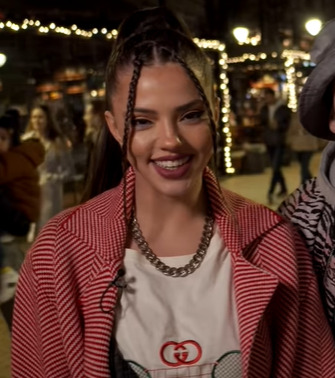
Also they reminded me that Lucy from No Angels (aka the sole reason Bulgaria 12′d Germany in 2008) still exists.

Also Azis.

There was also an intermission where Eurovision 2021 acts could say all the nice words to Victoria on their own part. And several artists chose to... how shall I put it... use up their several seconds rather interestingly. Like how The Roop would say something real quick only to delve into more of their usual “let’s dance, let’s discoteque! *hand scissors* ;P” self-promo, and Senhit carelessly being allowed to say whatever she wants in Italian without subtitles <3 Sorry sis, they’re only given to people from another white-green-red flag-color country.
About the iCard foreshadow... so there’s their advert about Victoria waiting in the line to get something in the Soft Vocals Store, and people ahead of her giving her money the standard oldfashioned way, and the old lady at the counter is... slow, to say the least. After a good amount of time spent waffling around, Victoria finally pulls out the iCard application and pays for the imaginary items she wants, then narrates some stuff about said application, and a Eurovision entry of hers plays when the old lady is at home, spending time in front of TV enjoying the music. Before the concert, the song that played was “Tears Getting Sober”. The advert played once more before Victoria’s big entry decision and entry MV reveal, and in place of the 2020 entry, “Growing Up Is Getting Old” was the one that sounded out loud... Now you may think that there were attempts at some sort of spoilage here, but after that ad before the concert EP NF result, there was this other advert starring Victoria that played “Imaginary Friend” at the end, a last-ditch effort to trick viewers into going “see? just because that ad played the chosen song doesn’t mean it’s the chosen song!! this song could as well be a chosen song as well!!” yeah no shut up GUIGO IS the chosen song kthxbyebye.
ANY LAST WORDS?
Having said all that praise, I actually have “Growing Up Is Getting Old” fairly low on my ranking. It’s just because the year is so damn good and I have a lot more songs to care about more than this, but I appreciate the gesture that this singer is sending very much. Good luck on your road to conquer Europe, Victory-ia, I’m sure you get the best of the experience and all, because you would deserve it.
#eurovision#eurovision 2021#rotterdam 2021 reviews#bulgaria#victoria georgieva#victoria#growing up is getting old#i was planning to publish this review on the same day as borisbubbles dropped his review of bulgaria#but my timing is lazier than his i gotta admit#so yeah#gif
6 notes
·
View notes
Text
March 1, 2021: The Hobbit (1977) (Part 1)
In a hole in the ground, there lived a Hobbit.

When I was 9, my school let us read a very special book, originally meant for kids, but beloved by everyone. My folks and I went to Borders Books (FUCK ME, I miss Borders), and we got an illustrated copy of J.R.R. Tolkien’s The Hobbit. I can’t find that book, but if I ever find it again, Imma buy it IMMEDIATELY, I tell you what. And...oh shit, it’s on Amazon for $12?

Well. I just made that purchase, I guess. But yeah, I loved that book when I was a kid, and this was during the same year that Peter Jackson’s Lord of the Rings trilogy began, with Fellowship, of course. And I wouldn’t end up watching those until a few years later, but I loved those too when I saw them. And I’ve NEVER seen the abridged version, by the way, I’ve only ever seen the extended editions.
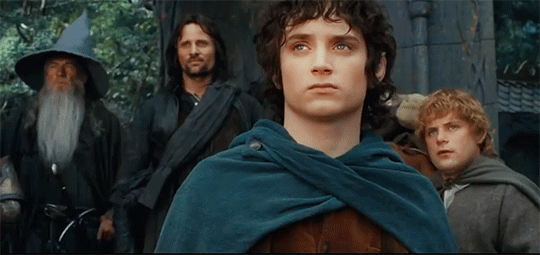
Although, I can’t call myself a hardcore fan. I’ve never read the Silmarillion, for example. Although, weirdly, I wanted it as a kid at some point, so I was almost there. But no, I ended up getting into comic books hardcore instead, so I can’t tell you the history of Tom Bombadil, but I can tell you about at least one of the fuckin’ 87 tieles that the Legion of Super-Heroes has been involved in. I’m not gonna like it though.
...Yes, I will, who am I kidding, I love the Legion. Anyway, I’ve still always been a fan of the franchise, and I was extremely excited when Jackson announced that he’d be doing an adaptation of The Hobbit! Seriously, I WAS FUCKING PUMPED, you have no idea. I re-read the book, I was super-excited...and then Harry Potter changed EVERYTHING. Kind of.

See, Harry Potter’s development as a two films made from one book seemed to kick off a trend. Breaking Dawn and Mockingjay are the two that immediately come to mind, as does this film. However, to be fair...that’s probably a coincidence. Yeah, this film was originally developed as two parts, WAY before Deathly Hallows got that treatment. And even then, Jackson and Del Toro had difficulty breaking it up into two parts, and three ended up being easier. Still...the change from two-to-three does feel a little connected to that trend.
Anyway, in celebration of that decision, I’m gonna break this review into three parts! Yes. Really. I want to see if it works. And so, let’s talk about the other most famous adaptation of this book by talking about its creators.
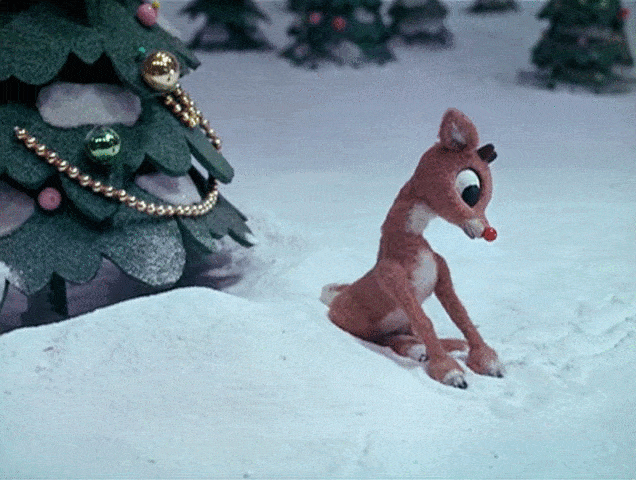
Yup. Rankin-Bass did 2D-animated cartoons, too! And this was one of their most famous ones, dating back to 1977. But wait! There’s more! This was followed by Ralph Bakshi’s version of Lord of the Rings by a different studio. You know, this one?

Yeah, that one. It was only based on the first two books, Fellowship and Towers. But it was technically unconnected to the Rankin-Bass version. Which is why it was REALLY weird when Rankin-Bass came out with an adaptation of the third book, Return of the King, right afterwards!
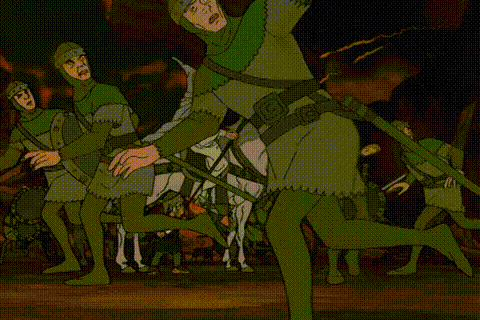
BUT WAIT THERE’S MORE. Because both of Rankin-Bass’ specials were animated by a Japanese studio called Topcraft, who’d actually worked with Rankin-Bass for years. But then, they went bankrupt a few years later, and was bought by Isao Takahata, Toshio Suzuki, and...Hayao Miyazaki. And it was renamed as...
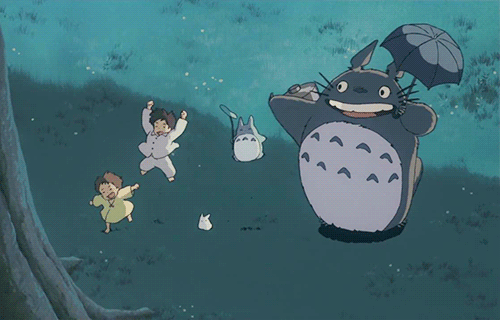
So, this is a Hobbit adaptation produced by the Rudolph people and animated by the people who would eventually become Studio Ghibli. Well, uh...holy fucking shit. Let’s DO THIS BABY. SPOILERS AHEAD!!!
Recap (1/3)

As we’re wont to do in this story, we head to Hobbiton in the Shire, where we meet Bilbo Baggins (Orson Bean). A simple Hobbit in a simple home, with a happy and simple life. But one day, he’s approached by Gandalf (John Huston), who seeks a burglar to help with the mission of a group of dwarves, led by Thorin Oakenshield (Hans Conried).
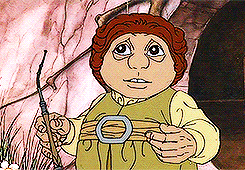
We also immediately start off with two songs from the original book, and I have to say that I like them a but better in the Jackson movies, but they’re still well performed here. Anyway, after dinner, the true goal of their quest is given. Beneath Lonely Mountain, the ancestral home of the Dwarves, there was a kingdom ruled by the King Under the Mountain, Thorin’s grandfather.
Through reading the lyrics of the song “Far over the Misty Mountains,” Thorin tells the tale of the takeover of the Dwarves’ great golden hoard by the dragon Smaug. Bilbo is tasked to help the Dwarves steal back the treasure stolen from them. And, while he’s extremely reluctant to be a part of all this, Gandalf basically forces him to, the pushy bastard. And Bilbo’s Greatest Adventure now lies ahead!
youtube
Speaking of, here’s the song “The Greatest Adventure”, sung by Glenn Yarborough, who is the living personification of vibrato. Fuckin’ seriously, this guy’s voice is ridiculous, but I love it so much. As the night passes underneath Glenn Yarborough’s hypnotically shaky voice, and uncertain, Bilbo stares out at the moon. Once it’s over, we’re on our way to the Misty Mountains.
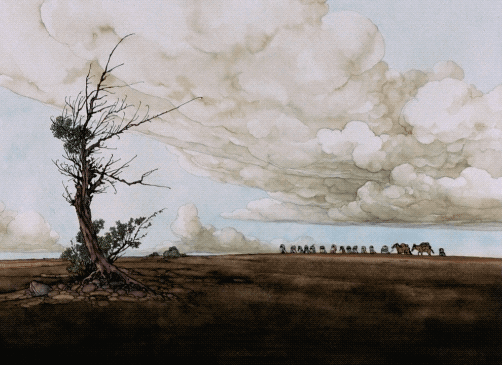
Bilbo’s having a tough time with the long journey and rough weather, and it doesn’t get much better when they encounter a trio of trolls. They send out Bilbo to try and steal some mutton from them, but he’s IMMEDIATELY a failure, and also manages to tell the trolls that the dwarves are present. Nice one, Bilbo. The trolls catch all of the dwarves, although Bilbo manages to escape.
The trolls argue about how to cook the dwarves, but before they get to do anything, Gandalf shows up and summons the dawn, turning the trolls into stone and saving the dwarves. While they’re initially quite frustrated by Bilbo’s failure, he makes it up by discovering a horde of goods and weapons stolen by the trolls. This is also where Bilbo gets his classic weapon, Sting.
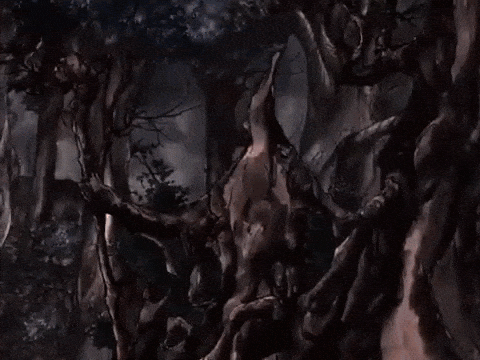
Gandalf, cheeky bastard that he is, suddenly reveals a map that he’s kept secret from Thorin, its rightful owner. Bilbo, a classic cartomaniac, is able to interpret the map. But there are also runes that they can’t quite read. And so, Gandalf brings them to his friend, Elrond (), who’s wearing a sick-ass glittery tiara that’s hovering off his head. How come Hugo Weaving didn’t have that?
Anyway, Elrond identifies the swords that Thorin and Gandalf grabbed as Orcrist, the Goblin-Cleaver and Glamdring, the Foe-Hammer, because FUCK YEAH, BABY, those are some fuckin’ NAMES! WHOOOOOO!

Anyway, he also points them in the direction of the mountain, and shows them hidden features to the map. They head through the mountains after this, and rest in a cave. Unfortunately, this cave is on Goblin territory, and the group (sans Gandalf, who’s disappeared to make out with Cate Blanchett or whatever) is quickly ambushed by a group of now-horned Goblins, who chant their song as they go “Down, Down, to Goblin-Town”. Which is a song that I love, unironically. It compels me to sing along.

The Goblins nearly kill them when they discover Orcrist in Thorin’s possession, but they’re saved by the sudden appearance of Gandalf with the glowing sword Glamdring. He kills the Great Goblin, and the group run out with the Goblins in hot pursuit. Well, except for Bilbo.
Yeah, Bilbo falls into a cavern below the mountain, and the dwarves think him gone for good. However, he’s miraculously safe on the ground, having landed in an underground aquifer, in which lives THE GREATEST CHARACTER IN THE MIDDLE-EARTH FRANCHISE FUCKIN’ AT ME I DARE YOU

And just so we’re clear, I’m not talking about the film version only, I’m talking about Gollum/Smeagol in general. Granted, I don’t want a film starring him or anything (coughCruellacoughcoughMaleficentcoughcoughClaricecoughcough), but I love this dissociative little dude so much. He’s one of my favorite fantasy characters in general, and is also maybe the best example of a sympathetic villain, in film at least.
OK, to be fair, I love Andy Serkis’ version of the character a LOT, like a LOT a lot, and it’s a great version of the character. OK, so what do I think of this version? He’s...interesting, actually. If I’m honest, I kinda like him. This is similar to how I always pictured Gollum when I was a kid.

I mean, listen to this description from the book, yeah?
Deep down here by the dark water lived old Gollum, a small slimy creature. I don't know where he came from, nor who or what he was. He was Gollum - as dark as darkness, except for two big round pale eyes in his thin face...He was looking out of his pale lamp-like eyes for blind fish, which he grabbed with his long fingers as quick as thinking.
I dunno, that does sound more like this version of Gollum to me, just saying. Anyway, while Gollum is off fishing in the water, Bilbo gets up on the shore, where he finds a little golden ring Not important, just a ring, definitely means nothing at all, NOTHING AT ALL, NOTHING TO SEE HERE.

The hungry Gollum (Brother Theodore) happens upon Bilbo, precious, wonders if Bilbo would taste good, and is basically about to kill him for his sweet hobbit meat, before Bilbo takes out Sting. Now afraid, Gollum offers a game of riddles. The two make a deal: if Bilbo wins at a game of riddles, Gollum will show him the way out. But if Gollum wins, precious will eat him raaaaaaaw and wrrrrrrrrrriggling!
The riddles commence, in a super-fuckin’-classic moment, and also ends with maybe the most bullshit moment in all of fantasy lore. After clever riddles with answers involving eggs, wind, and time, Bilbo’s last riddle is “What’s in my pocket?” The fuck, Bilbo, that’s absolute BULLSHIT!
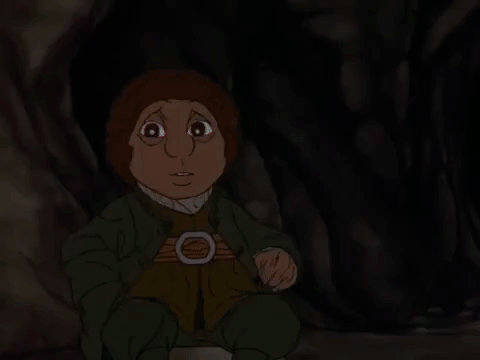
Not that it matters. Bilbo wins, but Gollum goes to find his ring to show it to Bilbo before he takes him away. Thing is, though, that’s what was in Bilbo’s pocket, which Gollum quickly figures out, my precious. He’s about to kill Bilbo to get back his birthday present, precious, but Bilbo discovers the secret trick of the ring: it turns the wearer invisible, AND THAT WILL NEVER BE A BAD THING EVER.
Gollum thinks that Bilbo’s escaped and runs after him toward the exit. This, of course, leads Bilbo towards the exit inadvertently, and he follows Gollum, then jumps over him to get back. To which Gollum screams the following:
Thief! Thief! Baggins! We hates it! Hates it! Forever!
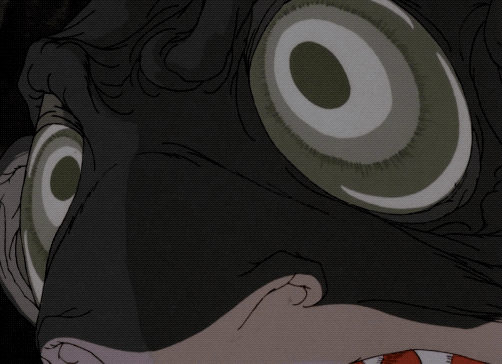
I hear you, buddy. I hear you. Well, once Bilbo escapes, he reconvenes with the rest, and shares his adventure in the cave, but leaves out the ring. And Gandalf seems to know, based on his dialogue. And I checked, and he figured it out in the book and Jackson movie, too. And I gotta say...WHAT THE FUCK GANDALF

I mean...DUDE. CHECK UP on that shit. Do you wizard job, man! If you’d been like, “Dude...you didn’t find a magic ring that turns you invisible, ight, because we’re FUCKED if you did”, NONE OF THE LORD OF THE RINGS WOULD’VE HAPPENED, AND BOROMIR WOULD STILL BE ALIVE
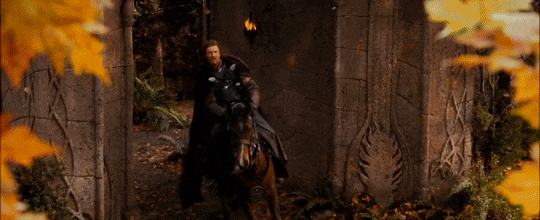
Everybody talks about the fuckin’ eagles, but WHY DO I NEVER HEAR ANYONE MENTION THIS SHIT? Gandalf the Grey: Middle-Earth’s most irresponsible asshole, I swear...
This seems like a good place to pause, actually. See you in the next part!
#the hobbit#the hobbit 1977#rankin-bass#orson bean#bilbo baggins#thorin oakenshield#john huston#gandalf#otto preminger#cyril ritchard#brother theodore#gollum#don messick#paul frees#glenn yarbrough#j.r.r. tolkien#rankin bass#hans conried
14 notes
·
View notes
Text
It’s All Coming Back to Me Now 5/?
To read on Ao3 click here
You can read the previous parts on Tumblr click here
‘Does this mean that I’m finally going to see you at home again?’ Catalina asks as they are once again walking back home.
‘Ehh,’ Kat grimaces a bit, ‘I’m helping Anna.’
She knows from their previous life together that Anna never learnt how to play any instrument. She could dance well enough and Kat had fond memories of that, and she had a lovely voice albeit clearly not trained, since she had been raised with the concept that music education was not proper for a noblewoman. Anna didn’t even have to say anything out loud. She just asked her when she was free to meet, the reason implicit yet understood by both.
‘That’s fine.’ Catalina bumps her hip against Kat’s. She doesn’t want her to feel bad for spending time with her friend. Friends. Family. Fellow queens. Whatever. But she misses having her around the house. ‘Just don’t forget about your old mother.’
‘You’re not old!’
Catalina would lie if she said that her heart didn’t skip a beat, dreading the last word would be two instead...my mother.
‘Anyway!’ Catalina knows from the tone that Kat is trying to distract her, probably having noticed her mood falling slightly. Perceptive kids these days!
‘I was talking with Cathy...do you think that us getting a PhD in history, Tudor history, would be cheating?’
‘Cathy, uh?’ Probably not the part Kat wanted her to focus on, but a mother has to take her fun where she can.
‘What?’ Kat is confused at first, before turning her head and seeing the look on the older woman’s face. ‘It's not like that.’
‘Okay.’ Catalina immediately accepts the answer. Not being believed is something that at best deeply upsets Kat and at worst triggers panic attacks. She doesn’t have all the details, Kat is reticent to talk about her life after Catalina’s death if not in broad general terms and Catalina has never forced the issue. She knows Kat would tell her, Kat said it herself. But every time she offers, she looks so dejected that she always refuses. But it doesn’t take a genius to connect the dots and blame Henry. It had been on her mind a lot, especially after Anne’s song and her talk with her. Whether Kat’s experience had been similar to her cousin, besides the ending, or not. Catalina isn’t sure she wants to know, to be honest. ‘But if it was...it’d be okay, you know.’
Kat shrugs, a subtle hunch in her shoulder. That won’t do. Catalina puts an arm around her shoulders and draws her in, kissing her temple. ‘Want to get a slice of cake to celebrate you writing yet another brilliant song?’ She said her piece. Short, sure, but that’s all she wants Kat to know. All the rest doesn’t matter. She’ll be there if Kat will ever want to revisit the topic again.
.
Right from the start it’s clear that Anna has decided to go for a modern take too. Music is once again streaming from Kat’s laptop, the young queen snapping her fingers as her predecessor sings.
Where my hounds at? Release the bitches (Woof)
Anne claps her hands, howling with laughter at Kat’s first venture into the song, which will also be all the other queens’ part. Jane shakes her head, rolling her eyes. Say one thing once and they will forever use it against you. She is ready to bet that Kat’s song will also include a swear word, just disguised enough that you can argue it’s not really swearing.
Lookin’ cute,
(Das ist gut)
All eyes on me,
(No criticism)
I look more rad than
(Lutheranism)
Dance so hard that I’m causing a sensation.
Okay, ladies, let’s get in reformation.
Anne is hollering, quickly followed by Cathy and, to everyone’s surprise but Kat’s, Catalina. Religion puns and Beyonce reference deserve a holler, queenly composure be damned.
Kat shoots a beaming smile at Anna. The fourth queen had been worried about her song not measuring up to the others, but the reactions are proving her wrong. She actually gets a standing ovation as the last ‘I’m the queen of the castle’ fades away.
‘Have you thought about choreography?’
‘Not really.’
‘Can I?’ Catalina exchanges a look with Anne. ‘Can we?’
Anna looks at the first two queens, both almost vibrating for the excitement. ‘Sure.’
Anne whoops and Catalina looks like she is one step away from doing the same. ‘It’s going to be glorious.’
‘Before we lose those two,’ they do look like they are ready to bolt, eager to start working on Anna’s song, ‘can I point out the,’ Cathy stops to look for the right word, ‘whiplash of going from Jane’s song to this. Both songs are amazing just…quite a different vibe?’
‘What about having an interlude? We would have three songs, well four with the intro. Interlude. Other three songs. Conclusion.’ Catalina proposes, her head seemingly back in the game and not on the dance anymore.
Cathy looks at Kat. They had sort of taken the lead on how to structure the musical…and Kat on writing the songs, having a hand in all of them so far. ‘We can give it a try.’
‘Also,’ Anne seems to be back among them too, ‘was that a Tinder reference?’
‘What’s Tinder?’ Jane sees the mirth on Anne’s face. ‘Wait. Do I actually want to know?’
.
The whole process is going surprisingly smoothly. Sure, it has been months, but considering they have no experience whatsoever with writing musicals, having 4 songs (out of 8 planned) mostly hashed out is impressive, in Cathy’s humble opinion. And that’s not even taking into consideration them being 16th-century queens reincarnated in the 21st century figuring out the modern world...and how to get along.
Unexpectedly, since she has been the one moving everything along, it’s with Kat’s turn that the smooth process comes to a halt.
‘Why the change? Not that I mind.’ Catalina specifies. Katherine had requested them to show up at a different location instead of the usual one. This one is more like a proper recording studio, with a live room with mics and instruments and a separate control room. ‘You know we have no idea how to use all of this, right?’ she jokes, gesturing to the mixing equipment. She frowns when Kat doesn’t even attempt to give her a smile at that.
‘I need you to be in another room. I know you will hate the song and-’
‘Impossible.’ Catalina scoffs.
‘I’m sure we will love it.’ All the others have joined them, and they chime in, agreeing with Jane. She has helped them all, whether with music or lyrics or both, and it is evident to everyone, even to Cathy, the only who still hasn’t worked with her, that she has a way with music.
‘No, you won’t.’ Kat is not looking for reassurance. She has no doubt about it. ‘It’s already going to be hard. If I have to worry about your reactions too...I can’t do it with you in the room. All of you.’ She had just recently managed to go through the whole song without having a major breakdown before the end.
While the first three queens appear confused, Cathy and Anna share a look. Having lived through Katherine’s reign as queen, they are the only ones with some knowledge about her past. They even had a brief conversation about it, not wanting to betray Kat’s confidence or their ‘vow’ not to look into each other’s past, but also needing to share their thoughts with someone who could understand them. Their conclusion had been easy: even if the charges levied against her had been true, which is not a given, as Anne’s example shows, considering her age she would have been a victim and not the temptress she had been portraited as.
‘Kat.’ Cathy takes a step towards her.
‘Please.’ Kat raises her hands in front of her. ‘Don’t.’
Cathy stops, nodding, slightly dejected, Anna laying a hand on her shoulder.
Catalina had noticed Kat was worried, but she didn’t think it had reached this point. And she doesn’t know what to make of Anna and Cathy’s solemn expressions. ‘Why don’t you show us and let us decide?’ She tries to encourage her daughter with a smile.
So that’s what she does.
All you wanna do All you wanna do, baby And ever since I was a child, I'd make the boys go wild
Kat had decided to use a backing track while playing the keyboard. She hopes that having to focus on playing and singing at the same time (and actually breathing, if things go as they went during her previous practices), she will be physically unable to think about the other queens being on the other side of the glass listening to her song (she angles herself so that her back is to the window and she is also physically unable to see them, even if she were tempted to look).
He just cares so much, he's devoted He says we have a connection
Her voice breaks and by the time she reaches the last chorus she is sobbing and hyperventilating. The effort required to finish the song definitely takes her mind off the others’ reactions…but everything comes crashing down as soon as the last note resonates.
She bows her head, shoulder shaking, hands frozen on the keys. She takes deep breaths, trying to calm down. Once she has it under control, or as much as possible in the situation, she pushes herself up. Time to face the music. Or not. What if she opens the door and they had left? They wouldn’t do that...right? Her...Catalina would not do that, right? She told her she would never be disappointed in Kat…but she never knew the truth...
But what if they are still there and are...disappointed? Angry? Ashamed of her? Would that be better? Or worse? One way or another, she has to know. And regardless, she has to leave the room sooner or later. It would only be delaying the inevitable.
#six the musical fanfiction#six the musical#catherine and katherine#six fanfiction#six the musical fic#six fanfic#fic: It’s All Coming Back to Me Now#my posts#mywork#six writing#six fic#six the musical fanfic#my ideas#my six posts
12 notes
·
View notes
Text
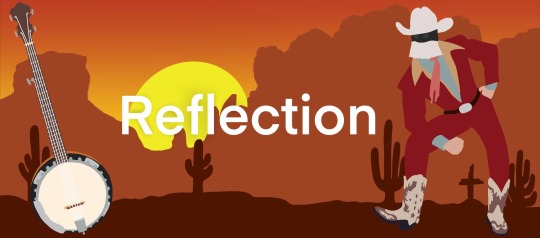
Pre-Production:
I feel that the pre-production for Coming Out Country went really well. We researched a few different things in relation to country music, but there was a big focus on the stereotypes held about the genre and those who listen to it, wether country always had ties to conservatism and right-leaning ideals, and examples of country artists that are/were more progressive or queer themselves. I also created a survey during pre-production which I posted in some groups online, as well as sending to people that I know. This was to find out a surface level view of the demographics of people who consider themselves fans of country music and wether these fans feel they had been treated unfairly within the country music fan base due to their identity. It also had a section for people who did not consider themselves fans of the genre, and instead they were asked what their feelings were towards country, if they disliked the genre they could tell me why, and what there stereotypes were about country music fans. This was interesting as something I noticed was that many of the stereotypes had their origins in classism (many felt that country fans were less educated and less progressive and suggested that this was due to their rural/less well-off upbringing).
We also conducted some zoom interviews during pre-production. With the group formulating questions to ask me. This allowed us to get an idea about the sorts of things I would be able to talk about in the film, and what was of interest to the group. This was very useful as country music is a special interest of mine so I would find anything about the topic to be interesting, whereas I understand that to the general populace it probably wouldn’t be that interesting. These interviews fed into the questions that would later be asked during the interviews during production.
I also spent a lot of time collecting the archive photographs. I managed to get a large selection of possible photos, whilst also learning that we have more photographs of agricultural machinery in the house than of me as a child. An amusing fact.
Production:
I feel that for the most part the production of our documentary was successful, though there are definitely a couple of things that I would improve upon.
Production began with me getting the b-roll footage of me working on the farm. This footage worked well within our documentary, though it is also something that I would have done differently had we not been in a pandemic. In a perfect world I would have liked to have had the group (or at least Luke as our DoP) come to the farm and film the b-roll footage properly with a camera. Though due to travel restrictions this was not possible. I had also left my camera in Edinburgh as I was not anticipating being home for so long. This meant that I had to film the b-roll footage on my phone, and ask my mum to be my camerawoman. Telling her what footage I needed, and then getting her to point and shoot. She now knows all about the rule of thirds!
Once I was back in Edinburgh, Luke and I shot the rest of the footage. We spent a few days in my flat filming the interviews as well as some of the songwriting process, and eventually the song. I think this worked really well as due to Luke being a friend of mine I felt much more able to open up in the interviews than I would have if someone I didn’t know that well had been the one asking questions. This meant that our doc took a much more personal direction than it was originally going to.
A lot of the song writing process was also filmed, though much of it wasn’t as it was a long process. I am pleased with the final song, though it was definitely difficult to write. Now that I have proved to myself that I can do it, I plan on writing more of my own music though.
We also recorded the song during this time, something that I think was really well done! I would have liked to record the song in a studio, but unfortunately to to time constraints and Covid restrictions this was not possible. With that being said I think the recording is of a really good quality for being recorded in my room, with sound equipment that Luke had access to.
Post Production:
The post production was also mostly successful, though once again there are a couple of improvements that could be made.
Beth began the editing process, putting together the first cut before I joined her for the rest of the editing process. I spent several days with Beth working on the edit, creating the narrative of the film from things that had been discussed in the interview. This was a difficult process as we had so much footage from the interviews with so many interesting points that deciding was to keep in the film and what to discard was a bit of a nightmare. I feel like what made it into the final cut worked really well though. We were working under more time constraints than initially planned due to other projects we were working on simultaneously, but each day we would send our cut to Sana and Leo for feedback, and act upon that feedback the next day.
One thing I would have done differently though is to have included the sound from the interviews underneath the archive photographs, as the lack of dialogue did impact the flow of the film. I don’t think this was too much of a problem, but having dialogue there would have definitely improved the final film.
Once we had picture lock, we sent everything off to Jess for the sound design. This was also done with more time constraints than we would have liked, but I feel that it was mostly successful. I think that the levels of the mix were great for the most part, and the different audio clips blended into one another nicely. Without any noticeable or jarring cuts. Though Leo mentioned that the water sounds over the archive photograph of me sitting by a pond was somewhat jarring. If we were to revisit the sound design I think that this could be fixed by either bringing it lower in the mix, or by adding similar linking sound effects to the other archive photographs. Or perhaps a mixture of both.
The final step of the post production process was to send it to Luke for colour grading, and for Luke and I to add the titles. The colour grading was really well done, and made the film link together much more than in our non-graded cut. The titles and credits were inspired by westerns, something that I think worked well within our film both through its thematic links to country as well as through the fun and quirky atmosphere it created. We also chose to have the credits appear in time with the final part of the song, and be in the colours of the trans pride flag.
A couple of other things I would have changed during post-production I should have done during this final step. The first is that I would have liked to have added subtitles to the song, as the lyrics draw on a lot of the topics discussed during the film. The use of subtitles would have been a great way to draw attention to this. The second thing I would change is the way that I am credited. I realised after submitting the film that at no point do we introduce the character that is the focus, for all the viewer knows this is just some dude with green hair and no name. Even if I didn’t include a name or anything earlier in the film, it would have been a good idea to have clarity given in the credits by perhaps saying ‘starring and directed by’ or something similar.
Overall:
Overall I feel that Coming Out Country was a success, both in terms of the final film, and the fun that we had making it. It is also a project that I plan to improve by acting on feedback from the crit, as I want to make sure it is as good as it can be and can be added to my portfolio.
Feedback From the Crit:
I know that some of this was covered in the rest of this post, but I have included it anyway :)
Sana:
What Worked Well:
The hand held footage on the farm
The structure
That it took a more personal route than originally intended
What Could Be Improved:
The cutting back and forth between interview, archive, and b-roll didn’t work as well. It would have been nice to remain with the b-roll for longer
It would have been good if my grandfather had been reintroduced into the narrative again, later in the film
The archive photographs could have been used more effectively. Some of them feel as though they were added a bit randomly
Leo:
“This is a really enjoyable film for people who know Tom, and don’t know much about country music. If you touch up the edit a bit it can also be a really enjoyable film for people who don’t know Tom, but enjoy country music.”
What Worked Well:
Fun to watch and listen to
Luke was included as a character (both visually and through audio), but he did not feel overbearing. The choice to not include his face even when he was on screen playing guitar was well made.
The titles
The song was well written and recorded
What Could Be Improved:
Dialogue should have ran under the archive photographs
The water sounds were a bit jarring
The narrative ‘sections’ could have been made to intertwine more, rather than being in distinct blocks
The Class:
What Worked Well:
It was fun to watch
It represented who I was well (it’s just a shame if people didn’t already know me they wouldn’t have known who the person represented was).
What Could Be Improved:
Could have played more on the juxtaposition between the country stereotype of right wing ideologies and my identity
It could have been interesting to have my trans identity act as more of a reveal
#documentary film module#documentary#documentary film#reflection#critical reflection#crit#pre-production#production#post production#film#films#student film#movie#movies#student#film student#study#study blog#studyblr#film studyblr#uni#university#uni project#university project#uni film#university film#ba film#second year#reel-em-in
5 notes
·
View notes
Text
weekly-ish media roundup (I’ve really gotta pick a consistent day for these but unfortunately the days of the week have kind of lost meaning for me, the only time passing I’m aware of is when it’s my turn to cook dinner. it’s been that kind of whatever length of time, y’know?)
listening: since sea shanties are apparently the hot new trend, please appreciate my two favorite variations on Drunken Sailor: Drunken Whaler (from the Dishonored soundtrack), which I love for how incredibly creepy it is, both in sound and lyrics, and Drunk Space Pirate by The Mechanisms, which just absolutely fucking slaps, wow I love The Mechs (sidenote: this recording is from their last-ever liveshow, and I am personally very sad I got into them just too late to ever see them live). whenever I have Drunken Sailor stuck in my head it’s usually some awful mashup of all three versions like. what do we do with a drunk space pirate? feed him to the hungry rats for dinner!
youtube
youtube
reading: Drowned God by R.F. Kuang (short story about one of the characters of the Poppy War series, which is extremely good like. political intrigue military fantasy, except I know when I say that most people probably imagine some grimdark white dude bullshit but no! this is not that! this is really fucking good and everything the genre can and should be!) it’s a very good short story and it did make me very sad, and also gave me lots of feelings about, specifically, one of the best m/f ships I’ve ever been convinced to care about. love a school rivals to reluctant allies to battle couple to enemies to reluctant allies again to maybe lovers to enemies again. it’s very tasty.
also, The City Unbreachable by Yoon Ha Lee (from the f/f anthology Silk and Steel) which has some incredibly intriguing sci-fi worldbuilding about sentient spaceship-cities and the societies on them and the people who are bonded with them
watching: Rowan Ellis, a video essayist I vaguely follow, made a video about Black Sails, specifically comparing the endings of Black Sails and Game of Thrones to explain like. why the Game of Thrones ending didn’t work, which is a niche that appeals to my personal interests, because when the whole self-congratulatory “storytellers are the most important people ever actually please give us awards” speech in the GoT finale started I was like. you’re not Black Sails you didn’t earn this shut the fuck up. so it’s satisfying to see someone else with an actual platform make those same points.
I don’t agree with everything she says, obviously, because I am opinionated and contrary but I like the way she analyzes things and I do think she makes lots of good points and uses lots of good examples. however, I do find it kinda disappointing that literally everyone who talks about Black Sails in any kind of serious journalistic way talks down the first season. she doesn’t do it as much as most people but I think that season 1 is good and everyone is just unfairly comparing it to season 2, the best season of television ever created, so of course anything else isn’t gonna look great by comparison. like, I do dislike the sexual assault plotline but aside from that, it’s really good?? literally the first episode has the “civilization (derogatory) needs gossip because it reinforces shame” speech. the “and they called me a monster” Moment and Flint’s Odysseus monologue are both season 1! the Max/Eleanor relationship and breakup that underscore the main themes of the show is season 1! season 1 is really good!
youtube
playing: more Knife of Dunwall, to the surprise of absolutely no one. I think last time I did one of these I was still stuck in the first mission because turns out sabotaging a factory is hard if you don’t pay for the favor that turns off the alarms, which I didn’t because I spent all my money on sleepdarts and elixirs. I changed my mind about doing the sabotage because I kept getting spotted, but when I went back to find the capitalist who owned the factory so that I could uh. torture the information out of him because that’s the low chaos option apparently, the labor organizer who I’d rescued had killed him. thanks Abigale. you’re so valid but you made my life so much harder. my expert strategy for getting through that level is that you knock everyone out before you fuck with any of the valves, so that when the alarms go off there’s hardly anyone left awake to come after you. also, move all the bodies away from the valves so they don’t die in the explosion. if you still care about getting low chaos despite picking the incredibly high chaos option. which I do lol. but it paid off, I barely killed anyone, I’m still at low chaos, everything is fine except that Billie made fun of me for setting off the alarms because Knife of Dunwall is a game about being disrespected by your own daughter.
anyway. I’m partway through the second mission now so. we’ll see how that goes
making: one of my roommates and I made pierogi from scratch last night which Imo is a little too labor-intensive to be worth it considering that you can also just buy pre-made ones and all you have to do is fry them. but it’s a cool thing to have done.
the thing I actually want to talk about is the lasagna we made today, or like. more generally the red sauce I make from scratch whenever we do pasta with red sauce, because I do not care for store-bought marinara on account of chunks of tomato are not a good texture for me. all of the sauce recipes including the lasagna recipe say to add crushed and/or diced tomato, and one of my favorite things about adulthood is that if you don’t like something, you don’t have to cook with it! so I can ignore those parts of the recipes! I do not actually have a recipe for the sauce the way I make it because I strongly believe that herbs and spices and garlic are measured with the heart, but trust me when I say it fucking slaps.

there’s spinach in there so that we, as a household, eat our vegetables, and the meat is ground turkey because I can’t eat beef
writing: mostly, cover letters. also a few fics with deadlines that I can’t talk about much yet because they’re for events, and then I posted a fic for an exchange centered around women in various MXTX works, which is about soft domesticity and I thought turned out pretty well
#dreaming.txt#contains pictures of food#i am. way more of a stereotypical housewife than i ever expected to be tbh#why does my life revolve around cooking and dishes
8 notes
·
View notes
Text
To Leave Or Die In Long Island
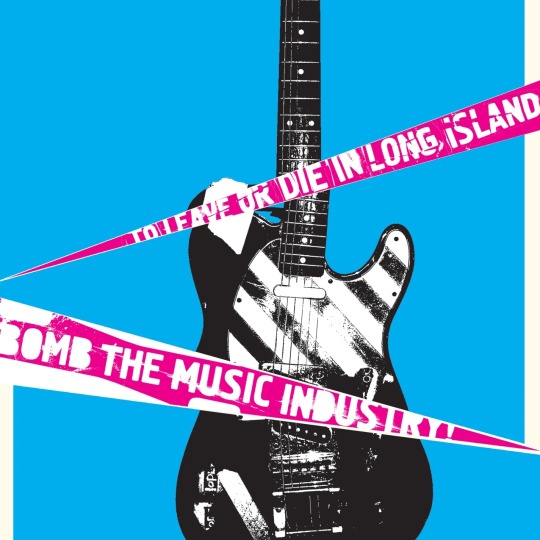
Of course, BTMI! was just getting started. Less than a year after the release of the debut, Jeff came out with a second album (well, at 8 songs, it’s more of an EP, or mini-album, or, in Jeff’s words, a digital “10-inch”). Though To Leave Or Die In Long Island is shorter in length than Album Minus Band, that only seems to have helped to focus the sound and songwriting on it. In some ways, it’s more conceptually ambitious, too – the album begins and ends with the same melody in a kind of parallel structure. Almost everything that was great on Album Minus Band is honed to a finer point here. (Strangely, according to this interview, this is apparently Jeff’s least favourite BTMI! album; while I understand his reasoning why, it easily ranks as one of my favourites.) As on that album, for example, Jeff continues to criticize the state of the 2000s punk scene. But instead of simply lashing out at obnoxious trend-chasers, his targets get more specific and his lyrics more potent as a result: opener “Happy Anterrabae Day!!!” takes aim at the overly-violent culture that can still be observed at hardcore shows. Between the first verse to the second, Jeff moves from jeering at the guys who threaten “some fourteen-year-old” to suggesting ways to improve the situation: “If I kissed you on the nose or offered you a hug, / How could you possibly still wanna fight?” He ends with a reminder of the positive possibilities of punk rock: “Think about the reason you went to shows at twelve years old, / We all felt alone, it was not to kick my ass!”
Whether it’s the inside-joke about a bandmate’s ladder-climbing career offer to join a more successful band (that didn’t work out in the end) on “Congratulations, John, On Joining Every Time I Die!” or the under-a-minute hardcore punchline of “Showerbeers!!!”, the album really shines on the lyrical front even when it feels like Jeff isn’t trying (which he admits he wasn’t on “Showerbeers!!!”). Then there’s the more serious stuff: “Dude, Get With The Program” is one of Jeff’s best songs about the paper-thin quality of that bullshit facade upper-management types put on when trying to soothe class antagonisms in their workplaces. Inspired by an experience he had at a job in which a company’s managers started lecturing workers on being part of their “family” right before the paycuts and firings began, he vents his frustrations: “You’re working on your first million, / I’m on my first thousand, / And bills are due tomorrow.” There’s the emptiness of the rhetoric fed to those who get the short end of the stick under capitalism: “You didn’t get fired, you’re ‘laid off.’” The chorus clears it all up: “You could have figured out a way to help us out, / But you just said: / ‘Hey, go ahead and get fucked!’”
youtube
By contrast, the less-oppositional “Stand There Until Your Sober” has been a long-running fan favourite possibly due to its confessional quality. It’s a song about drinking too much, feeling like you’ve fallen behind in life, like you’ve missed your chance to grow up, and being generally miserable with nothing to look forward to except the awesome party you have planned for your friends at your funeral (because “mourning is for suckers!”). Over a relatively sparse 3/4 groove with some nice musical flourishes (those backmasked acoustic guitar chords that open the song always get me), Jeff sings about the city’s ambient lights blocking out the stars, making out with a stranger on a boat, and earning only “a hundred and ten bucks for twenty hours” while watching his friends achieve a comfortable stability in life that always seems out of reach for him. It’s the ultimate loser’s anthem, and maybe some of the most poetic stuff to come out of BTMI! Even in the midst of the despair, a ray of positivity breaks through near the end of the song: “You’ll finally know that life’s okay, / Even when the bad things happen.”
The music, too, takes a giant step forward on To Leave Or Die. Though Album Minus Band already showed signs of breaking free from the confines of ska-punk, Jeff signals his ambitions to fuck with the formula as much as possible right off the bat with the cheesy fake-out synth-rock intro to “Happy Anterrabae Day!!!”, gradually revving up the tempo until it reaches the hardcore intensity that kicks off its first verse. Remember what I said about Jeff’s harmonies on Album Minus Band? Here’s the thing: he might not be a great singer (something he’d address directly on the band’s final album), but he sure knows how to layer his voice in his wall-of-sound production to trick you into thinking he is. Of course, he pulls back the curtain at the end and mutes all instruments for the final chorus’s last couple “na-na-na” sections, revealing a chorus of Jeffs screaming vague harmonies and polyphonies at the top of their lungs, barely staying in time with each other, let alone in tune. He knows exactly how absurd it sounds and works that to his advantage perfectly – it never fails to make me laugh out loud. I actually first got my sister into this band by showing her this part of the song, which she couldn’t believe would be left in an actual studio recording. It’s both incredibly funny and incredibly punk; what could be more so than a guy going “Yeah, I can’t sing, but how about I make a whole goddamn choral arrangement out of my voice anyway?”
The peak of the album’s musical ambition arrives at its climax and final song, “Syke! Life Is Awesome!” A tour-de-force of multi-section songwriting, Jeff describes it relatively accurately on Quote Unquote as being composed of “20-second blasts of different genres whether it be alt-country, post-punk, reggae or synth pop.” What that description doesn’t quite capture is the progression of the song, from an acoustic-strummed folk-punk intro into a kind of freak-folk chorus strung out on its own silliness, from there to a classic hardcore punk tempo interspersed with a couple bars of ska, building to an unstoppable outro with a horn section that sounds like a Motown track’s backing dialed up to light-speed. That excellent “na-na-na” vocal melody from “Happy Anterrabae Day!!!” is reprised here through the horns at the end of the song, a motif for the observant listener to enjoy. Lyrically, too, this might be one of my favourite BTMI! songs; Jeff says this one was about a time he got to talk with the lead singer of Squeeze and realized how cool it was that his life had turned out in a way that such a thing could happen. It’s the end of the song that really gets me: sprinting across the album’s final stretch, Jeff begins a long, uninterrupted phrase following an instrumental break that details all the weird things that happened in his life in the chain of events that got him to where he was at the time of writing that song. It evokes a sense of wonder at the simple mechanism of cause-and-effect: “And if I knew how to throw a football, / I would have never played any music, / And if never got my heart broken, / I would sing ‘blah blah fucking nothing.’” It’s a celebration of the uniqueness of the timeline that makes your life unequivocally yours, as it could never be any other way. In philosophy, we might call that a “haecceity.”
5 notes
·
View notes
Note
Hello gem!! This may seem a little weird, but when you're writing a new fic how much planning do you do in advance for it? Like as an example, You Have The Right, how much of that was carefully planned? Or did you just jump into writing it after coming up with an idea and thinking about how you wanted the story to go? How do you plan out emotional beats and where to plant the symbolism and all that in your fics?
aha hehe this is truly embarrassing um. putting this under a readmore bc its long and sort of differs from fic to fic!!! =( ̄□ ̄;)⇒
when it came to planning you’ve got the right i got. the premise. and then i figured out names for dice. and then i titled it with an owl city song because i thought it was funny.
and then i guessed at the plot of the following chapters going by lyrics from the song:
and i had scenes i knew i wanted- the masked slow dance, the chandelier, the ending, but beyond that i had absolutely ZERO plot until i was about midway through chapter two and realized i was also writing about self-destruction issues and i was like “i can use this (≖ᴗ≖✿)”
calling all cars, there’s an officer down - initial meeting, starting to live together
shot through the heart on a night on the town - at this point they start getting gay
and evidence of your fingerprints was found - cant really remember my plan here but it was basically saihara being more secure in deciding ouma was the thief of cards
and now/you’ve got the right to remain right here with me - i initially planned this to be one chapter bc when i started writing i was like “hm yep 4 is probably enough!” but i ended up splitting it into two. anyway i knew that was the resolution and i knew i wanted a dramatic rooftop confession.
but yeah beyond that absolutely nothing for that one!!!!!!!!!!!!!!!!!! i do. very little shit for my more lighthearted fics. i’ll give you the notes for my recent halloween one, actually! (so. spoilers for that go read it. it’s not good but i DID work too hard on it.)
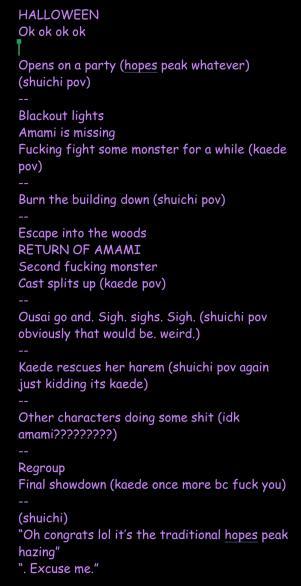
obviously i ended up shuffling some scenes around a bit and i cut some stuff bc it was getting lengthy but uh. yeah that’s what i started with and tends to be what i generally start with for most stuff!
i don’t write chronologically, though! i write sort of by tone and by mood. usually i’ll start with the first scene in a fic, and then jump down to fill in a few lines later if i’ve thought of some banter/ a good action sequence/some nice description, and then i’ll come back and work around those. i think i plan dramatic beats to some extent? like i usually have a vague idea of my pacing and how long things tend to get, and sort of arrange other stuff appropriately around it. i think writing out of order kind of helps- in the halloween fic, for example, it made it hellish to keep track of injuries but also having most of the final confrontation written fairly early gave me quite a concrete idea of where i was going to end up?
therefore you and me has an eensy bit more planning put into it- again, i plotted that out with lyrics and had a couple more notes for each chapter, but it sort of adapted and morphed as i went! i planned for the ng code/second game thing after about... chapter two, i think. i also had notes on themes/things i wanted to develop as the story progressed from the very start, which i didn’t have for you’ve got the right! yay for improvement?
symbolism in stories is stuff that just pops up from me! i use pinterest to help me out with it sometimes, but often i’ll just get a good visual and then sort of try to implement it in a recurring way- or i’ll find a theme and then try to think of ways to represent it in the story.
for the first example, um- in kattar shuffle the card symbolism was an accident, but i had multiple characters use them in the first chapter and then i started thinking about chance and poker and gambling games that rely on assessing other people and having a dealer and i thought it worked really well, so i’ve sort of rolled with that!
for the second, in you’ve got the right, i really wanted to build sort of a. domestic-y homey parallel to all the crime and high drama, which is where the coffee comes in! i think making someone coffee is just. so intimate. that’s why it happens so often!
anyway this is all contrary to kattar shuffle, which as a mystery built up of smaller mysteries, has about four physical papers lying around my study rn that all look like this, both for individual ‘arcs’ and for the overall plot and as opposed to me looking like someone who puts zero thought into his writing, makes me look like an insane person ☆*。★゚*♪ヾ(☆ゝз・)ノ

(obviously i cant show the others bc. spoilers.)
#thank you so much for asking though!!! lmk if you want me to clarofy anything or get more specific!#chatter#asks#writing
10 notes
·
View notes
Text
Every thought I’ve had about Cardigan
The other day I wrote this post about why I love The 1 so much which really just encapsulated every thought I’ve had about the song and decided I want to do it for every Folklore song and what better order to do it in than the track list? So with that in mind, here is every thought I’ve had about Cardigan up until this point.
Continuation of ‘Classic Taylor’ trends:
I’m not going to go too deep into this because I explained it in depth in the post I did on The 1, but in short, Taylor has had a habit since RED to have the story of her albums start with the third song while the first two are linked and explain the themes of the story in the album while not directly being part of them and certainly not the beginning of the story.
In Folklore’s case, The 1 and Cardigan explore the themes of how the choices we make matter. Both songs also explores escapism by their reliance on nostalgia in an album filled with songs that have unquestioned plots. It’s not until the end of each song that we’re hit with the harsh truth that things didn’t work out for the narrator of The 1/their love interest or Betty/James.
Interpretations of the song:
One thing I’ve found very interesting about this song in particular is how the fandom has found multiple different interpretations for the lyrics, some I don’t think I would have even thought of had it not been put forth to me.
It’s clear that when putting together this album, the “main” interpretation that Taylor wanted us to get from it was that it was the events of the love triangle from Betty’s point of view. I will say that after listening to the demo for the song, I do get the impression that while Cardigan was among the first to be written for the album, it was the last to be added to the triangle. I have no proof for this, it’s just the feeling I get. I do also find it interesting that Taylor had the “correct” lyric of “Peter leaving Wendy” in the demo but changed it to losing. While either would have worked for me, I truly believe this was an artistic choice to represent that it wasn’t James leaving Betty in the gym or even getting in the car with August that broke Betty/James up, it was the make up of many choices James made, again, going back to the theme that choices matter. I gave an example about this in the post I did on The 1 so I won’t go that into it, but August existing wouldn’t have meant anything to Betty and James’ relationships if James had just spoken to Betty rather than sulking. Alternatively, even if he still went with August, Betty may have forgiven James if he had been the one to tell her and apologised rather than Betty having to hear it from Inez. To quote the song, James continuously ‘ran like water’ and took the path of least resistance rather than do the right thing and all of that added up.
While the love triangle was obviously the angle Taylor wanted the listener to hear this story from, I definitely feel like this song came from a personal place for her. While I still think that Folklore was a recovery album surrounding fame but more specifically her masters as seen in this post, the demo of Cardigan also feels like she sprinkled in elements of her past romantic relationships, specifically with Harry and Jake, into it. This also somewhat lines up with a lot of people saying that The 1 gave Harry vibes.
In saying this, there’s one other theory that I hadn’t thought of at first that has had my attention lately. Unfortunately I do not have the posts on me at the moment, but I’ve seen speculation recently that The 1 is actually about Taylor herself, or at least who Taylor would have become had she not gotten famous. While I didn’t put much thought into it at first because I found it a stretch, while rewatching the Cardigan video last night, I started feeling it was more viable. Though I initially saw the thing Taylor ‘came back to’ in the Cardigan music video as being music, I do find it interesting that music seemed to only be the way she travelled in the video with the ultimate destination being back home putting on a Cardigan, all of which are very ‘normal’ things linked with averageness and not the celebrity lifestyle like the mystical and severe places Taylor travels to in the music video. It also intrigues me when considering how much Taylor looks back fondly at times where are different throughout the album (Seven, August, TLGAD, Invisible String etc) compared to the harshness of now (Epiphany, Hoax, MTR etc). And finally, looking through this lens, I can’t help but think of all of the ways Taylor has spoken about trying to be a friend to everyone in the 1989 era; the era where her ‘celebrity’ image was at its peak. So yeah, while I can’t say that I fully believe in the theory, I could see it being the case where Taylor trying to chase the “two girls” of fame and normalcy at the same time made her lose ‘the one’ being fame only for her to end up going back to it later on.
While I haven’t gravitated to this song as much as others on the album, when looking at a personal interpretation, it definitely reminds me of my estranged father. When singing it, I also like to change the words to “leaving like your father, running like water” because apparently the men in my family are just not family people lmao.
Its connections to other songs:
I appreciate the story telling and cleverness of the triangle. Having Cardigan start by sounding like walking on cobblestone, “I knew everything when I was young” versus “I’m only 17, I don’t know anything”, coinciding lyrics at the same times in Betty and August and more little details like that warm my heart. I will say though that Betty and August feel more connected as a story to me than Cardigan with either of the others and I think part of that is because like I mentioned, I believe Cardigan was added to the triangle last and altered to fit it as opposed to made for it if that makes any sense. I will also say as I’ve seen it spoken about, I don’t think Betty was calling August a ‘thrill’ in Cardigan. The thrill was James feeling powerful/loved by having August be willing to do anything for him and the ‘thrill expiring’ happened once he realised that that wasn’t enough for him and Betty’s realistic love meant more to him than August’s selfless infatuation.
I already mentioned this in my The 1 post, but If you never bleed you’re never going to grow links so well with But now I’m bleeding and Peter losing Wendy.
Likewise I think I’ve seen this film before and I didn’t like the ending and Tried to change the ending also links together very well.
Anyway I think that’s all for now so I’ll just end it by saying while this isn’t a song I gravitate to, it’s one I can appreciate and see the charm of and am glad to see it has been so well received by fans and the general public.
7 notes
·
View notes
Note
How do you feel about the sudden shift in pacing in SUF? Personally, I was so disconcerted at first, I thought that it was /worse/ than the original series, then I rewatched, and realized that it was just really different. It's definitely a lot more blunt in the humor, and of course there's the whole Steven-not-knowing-everything-anymore-thing. What do you think?
The overall pacing of Steven Universe Future has been very enjoyable!
I genuinely find it to be pretty damn good actually, as its focus is crystal clear on where it should be. That being Steven Universe’s inner dilemma of what he’s supposed to do now the whole massive conflict with the Diamonds has been solved. As much as I loved Steven Universe’s story when it focused on the main conflict surrounding the Crystal Gems against their own planet and learning more about each of them, along with Rose’s entire backstory too, it still suffered from some of the Beach City episodes dragging it down in the pacing when it could’ve focused more on the other characters, like further exploring Lapis and Peridot’s chemistry for example. That isn’t to say I hated every single one, as some were actually enjoyable and gave me an appreciation for them in a sense. Sometimes it’s okay to take a breather and have a simple slice of life episode. Fun fact, I didn’t get into watching the OG series, until the movie was released last year, so that gave me more of a tolerance for the Beach City episodes. Makes me very glad that I waited this long because hoo boi some of the hiatus issues I’ve heard about from a close friend of mine, who got into watching this series when it first aired back then, weren’t pretty. LMAO!
Anyways, the idea surrounding Steven’s characterization of not-knowing-everything-anymore-thing, as you’ve put it, isn’t actually as weird, from I’ve heard some people make it out to be for a form of criticism that people on Tumblr have made rebuttals against before. It’s wonderfully consistent with what Steven’s character is all about and that’s trying to figure out his place in the world. This has always been a consistent struggle for himself, like the lyric mentioned in the full version of the series opening from Steven.

“I will fight to be everything that everybody wants me to be when I’m grown!”
Steven’s whole internal conflict surrounds not knowing whether or not he can exactly be like his mother, which puts a shit ton of insecurities on his own self-worth into trying to fit in with the other Crystal Gems because he’s not your average-every-day-kid that you see in society. He’s a special hybrid of human/gem that neither side of the species connected to him has ever seen before and that puts a ton of pressure onto how the boy feels a need to connect with both sides of himself. While he already has a deeply loving relationship with his father, Greg, Steven also wants to better understand that Gem lineage and why his mother was so revered by what he perceives to be these amazing warriors, who fight evil. Never mind putting this onto a kid’s existence, as soon as he or she’s brought into reality, but even an adult would struggle a lot with all this stuff. As the original story progressed, Steven learns all of the hardships the Crystal Gems faced many centuries ago and what his own mother did to protect the Earth in exchange for many issues Steven would have to handle, as soon as Pink Diamond gave up herself to create the child.
Holy shit, did he ever have to handle the baggage from Pink Diamond.
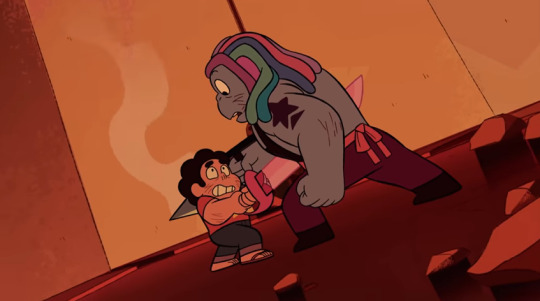

You should’ve shattered me back then. At least if I were in pieces, I wouldn’t have to know how little I mattered to you. You didn’t even tell em. You bubbled me away and didn’t ever tell your friends! MY friends!

I’m going to tell them. I’m gonna tell them everything.
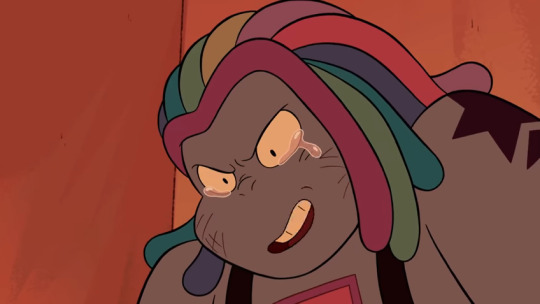
Then you really are better than HER…
Pivotal moments, like in the episode centered around Bismuth, paint everything in an entirely different light for Steve’s ideals based around his mother. At first, Rose Quartz was implied to be an individual who could do no wrong to any living thing, but hindsight from Bismuth’s trauma paints everything in an entirely different light for this poor boy having to take on the entire blunt of this figurative dagger. A question that is represented in the episode, Storm In The Room.

Did you make me, just so you wouldn’t have to deal with all your mistakes!?
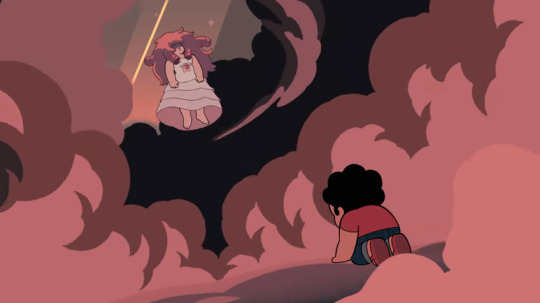
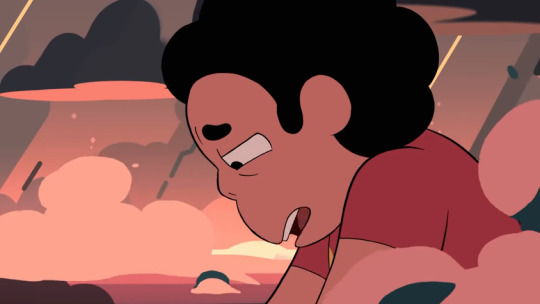
Is that all I’m here for…?
I’ve went into more detail about this episode in a previous ask surrounding this topic, so you can check that one out in your free time, but the point I’m making here is Steven has centered a lot of himself around the idea of Rose Quartz being a self-less individual and helped many others through her actions that put this entire series into motion in the first place, but when all of that from this kid’s perspective is thrown out the window through tragic events that also happened in part because of her decisions, Steven starts questioning everything about his life. I’d like think in these moments Steven’s internal dialogue is worded around these types of statements.
“I wanted to be a savior, like her. Although, she did bad things, too! Am I no different from her? Can I truly help people without hurting them in the process?”

That’s why he helped the Crystal Gems in The Test Season 1 episode feel better about their own issues, while hiding how hurt the boy felt about being lied to about the obstacle course being 100% percent un-failable because Steven adopted the selfless image of his mother in this important moment. Steven listened in on a private conversation he had no business hearing from Garnet, Amethyst, and Pearl that fueled this idea further of becoming a savior to all living things and put into perspective that these “amazing warriors” were in fact very insecure like himself and needed Steven in their lives, just as much as he did.

That’s why he helped heal Lapis before.
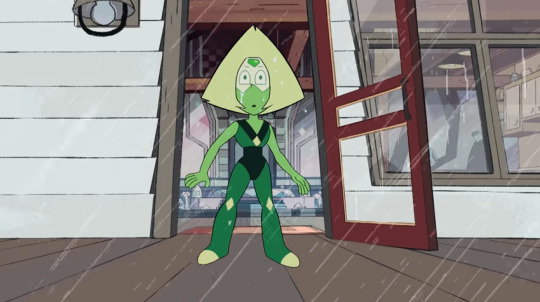
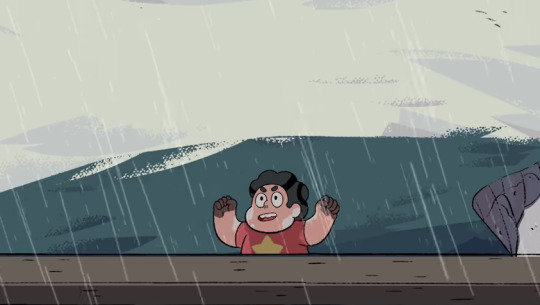

That’s why he helped Peridot open her eyes and come outta her shell.
I could go on and on, but in a nutshell Steven has made life revolve around others so much that feels only natural to help anyone he can, considering that’s what his mother believed in. Even if they’re morally questionable individuals, Steven still tries to see the good in everyone. His angry statements against Lars attitude about Rose put all of that into perspective to contemplate about.
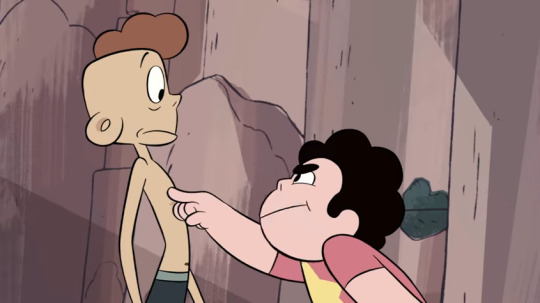
What do you know about my mom!? I didn’t even get to know my mom, but I do know she saw beauty in everything! Even in stuff like this and even in jerks like you!
Steven’s only known what to do because he’s adopted the ideals of his mother so much. Kind of like being brought into existence like your typical Gems, where they’re programmed to feel that way and commit the actions they’re all built for. It’s poetic honestly that he’s helped everyone, but not himself in the long run. These issues were piling on since the start because Steven didn’t have to worry about feeling inferior because he could always help everyone in this series, but now that the events of Steven Universe Future have occurred this puts everything into a more deeply poignant light for the kid entering a more mature phase of his life now and is going to reflect on every little aspect of himself.
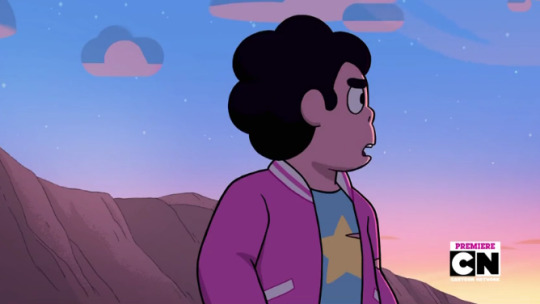
There’s no such thing as happily ever after. I’ll always have more work to do.

But if there’s nothing to work out…
Steven Universe Future is a brilliant character study pay off to all those five seasons that were paving the way to this cementing the idea that Steven has issues that are spiraling outta control from putting all of independence into the idea that he has to be a savior like his mother was. Much like how Spinel was so attached to Pink Diamond as a “best friend”, Steven puts so much faith into the mindset that he has must stick his guns and stay that perfect savior everyone knows/loves. It’s unhealthy emotional attachment that is coming to light with these Pink outbursts of his. While he still loves what his mother stood for, despite feeling very conflicted about her in general these days, still strives to be the best parts of her and not the worst, hence the ending of the Rose Buds episode where he puts the painting of her pure persona into Lion’s mane realm.
It’s entirely reversed roles now where the Crystal Gems and mostly everyone are fine, but Steven is far from being emotionally stable currently in recent events. Steven Universe The Movie built the subversive punchline that this epilogue series has been delivering strongly on so far and hope it will continue to do so. I’ve loved how they’ve deconstructed Steven’s characterization.
To end this lengthy post, I’ll refer to these words from Jasper that sums up everything on Steven’s issues. She may have been seriously harsh, but Jasper aint wrong in some ways about Steven feeling very low on himself in general.

You think everyone needs help, but its only you! No one is as pitiful as you!
On a side note, regarding the humor real quick in Future, I can see why you’d think its more blunt. It’s very on the nose with how much it pokes fun at itself, but honestly I don’t have issues with it all. I don’t know about you, but I find it fucking hilarious how they’ve been openly taking potshots at their previous ideas in the story line. I’m always down for a creative team being snarky with themselves!
Thanks for taking the time to read this detailed post of mine! =)
#steven universe future#steven universe#asks and answers#my asks#real talk#my two cents#this was a lot fun to answer#suf analysis#long post#thanks again for the ask!
99 notes
·
View notes